

 Front cover: Senior Gunai Elder, Aunty Sandra Patten, performs a traditional Smoking Ceremony for the opening of Gippsland Primary Health Network’s new Bairnsdale office.
Front cover: Senior Gunai Elder, Aunty Sandra Patten, performs a traditional Smoking Ceremony for the opening of Gippsland Primary Health Network’s new Bairnsdale office.



 Front cover: Senior Gunai Elder, Aunty Sandra Patten, performs a traditional Smoking Ceremony for the opening of Gippsland Primary Health Network’s new Bairnsdale office.
Front cover: Senior Gunai Elder, Aunty Sandra Patten, performs a traditional Smoking Ceremony for the opening of Gippsland Primary Health Network’s new Bairnsdale office.
It is our pleasure to present the 2021-22 Gippsland PHN annual report as we reflect on a year of progress and achievement despite the challenges of the ongoing pandemic impacting on our organisation and the broader community.
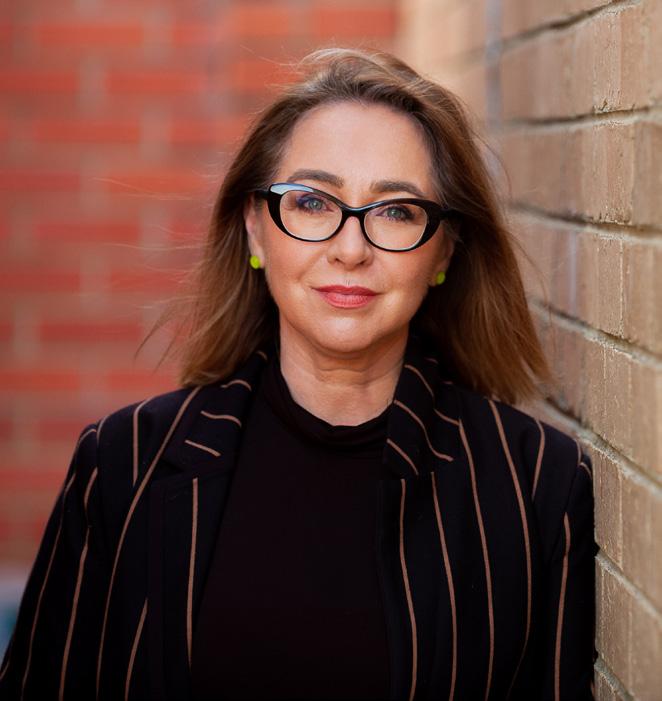
Commissioning services is one of our four key functions, so we continue to transition to a process which demonstrates success through outcomes rather than outputs. As part of this process, extensive consultation was undertaken with providers, health professionals and consumers to inform the strategies for the Primary Mental Health Care and Alcohol & Other Drugs programs.
Examples of what consumers told us include:
• They want to be made to feel safe and welcome and to receive culturally appropriate care
• They want to build a relationship with someone who knows their story
• They want to feel comfortable talking about their substance use and mental health without fear of stigma
The feedback from these consultations informed our tender documentation which was enriched by continuing to place the consumer at the centre of service design.
A future health system which caters to a connected and confident consumer was the topic of a presentation to the Board’s strategic planning day. The presentation described a future where digital tools will enable clinicians to work in innovative workforce models to engage with empowered consumers who take an active role in managing and improving their health and wellbeing.
New technologies and methods which support seamless care for consumers were also central to Australia’s Primary Health Care 10 Year Plan 2022-2032, which was released in March 2022. The future focussed plan also aims to put the patient at the centre and foreshadows proposed funding reforms and system redesign to implement localised and place-based collaborative models of care that are driven by community-led solutions.
Gippsland PHN is well placed to embrace the future of reform through our investment in digital technologies to support primary care in implementing telehealth solutions, remote patient monitoring of chronic disease, and social prescribing; and through our planned exploration of community led place-based models over the coming year.
Amanda Proposch CEO Gippsland PHNAs an organisation we consulted with a broad range of stakeholders as part of the process of developing a draft Reconciliation Action Plan (RAP) which had input from community members and Elders. We are grateful to those who generously shared their time and wisdom and look forward to launching the RAP when it is approved by Reconciliation Australia.
We recognise the link between climate change and health, and indeed the responsibility of the health sector in taking and advocating for action. Stakeholders and advisory groups have had input into the Gippsland PHN Climate Change Position Statement and Action Plan as the organisation sought to understand and develop its leadership role in climate mitigation and adaptation.
Our formal advisory groups continue to be a source of valuable feedback and advice as we test ideas for new programs and services and as they identify emerging issues within their networks and spheres. An evaluation was undertaken during the year that demonstrated their intrinsic value and their success in adapting to an online environment. We are grateful to these groups for their time and considered opinions.
All of this would not have been possible without the dedication and expertise of our Board Directors and our passionate and enthusiastic staff who live the Gippsland PHN values daily as they seek to work collaboratively and constructively with our partners, providers and community to achieve our vision of a measurably healthier Gippsland.
Therese Tierney, Chair, Gippsland PHN Amanda Proposch, CEO, Gippsland PHN
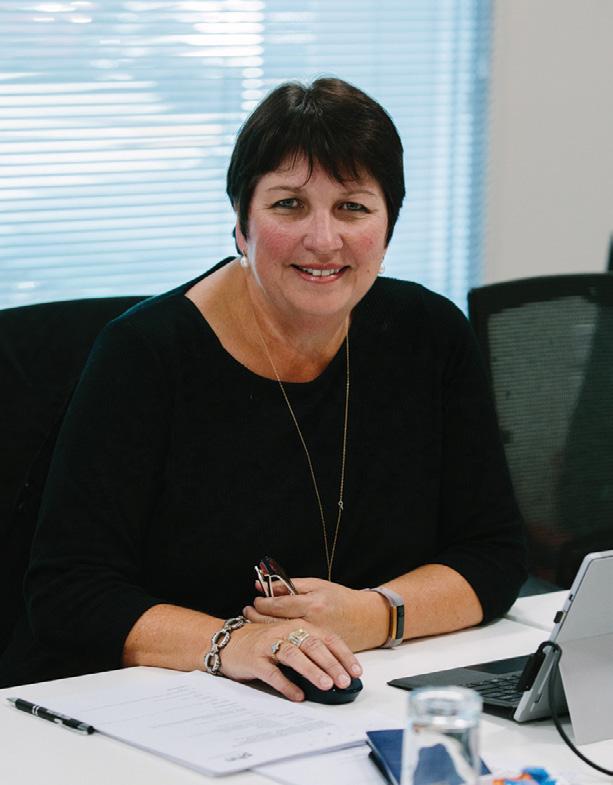
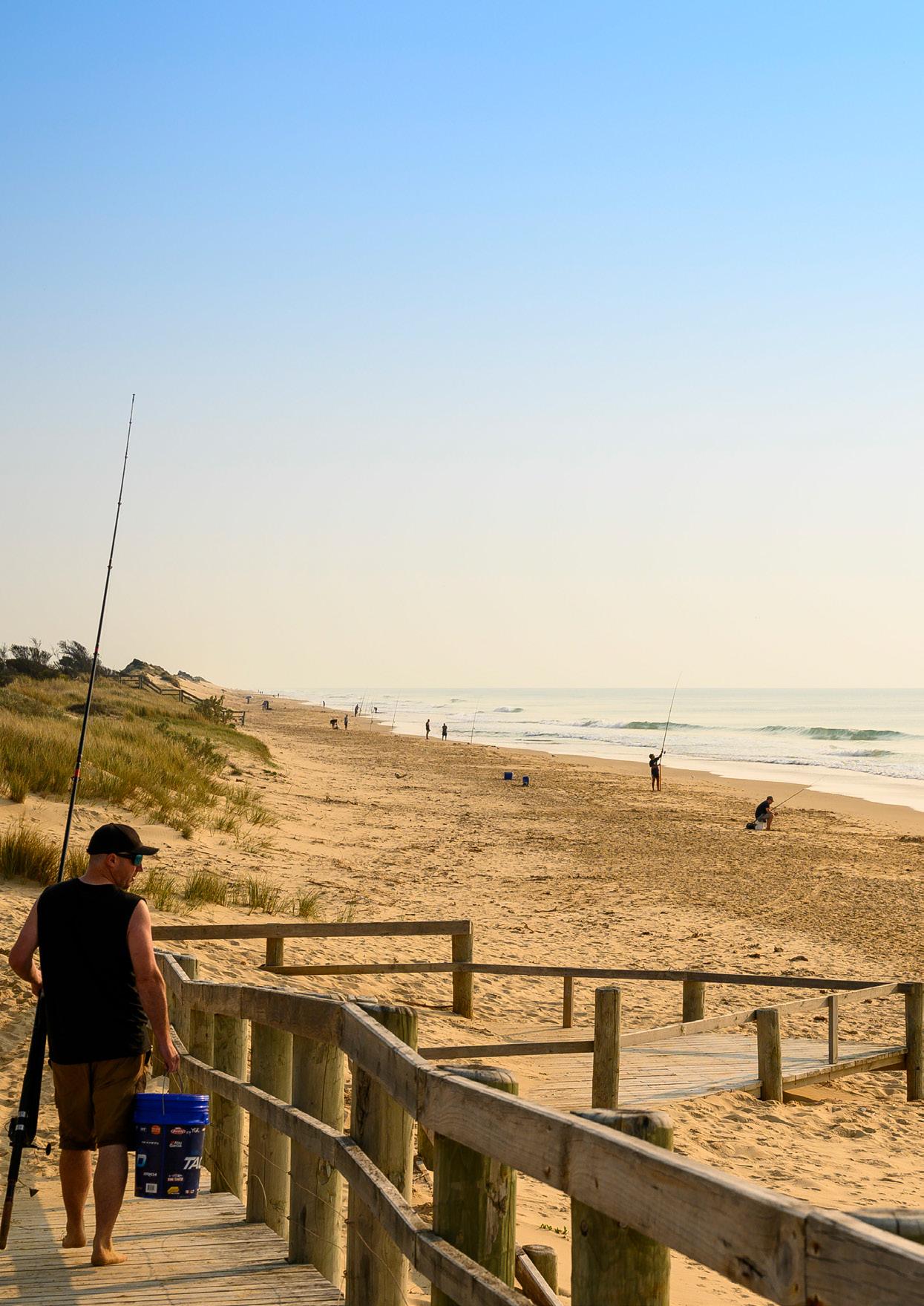
Doctors visit Gippsland secondary schools
Sport and play scores goals in East Gippsland
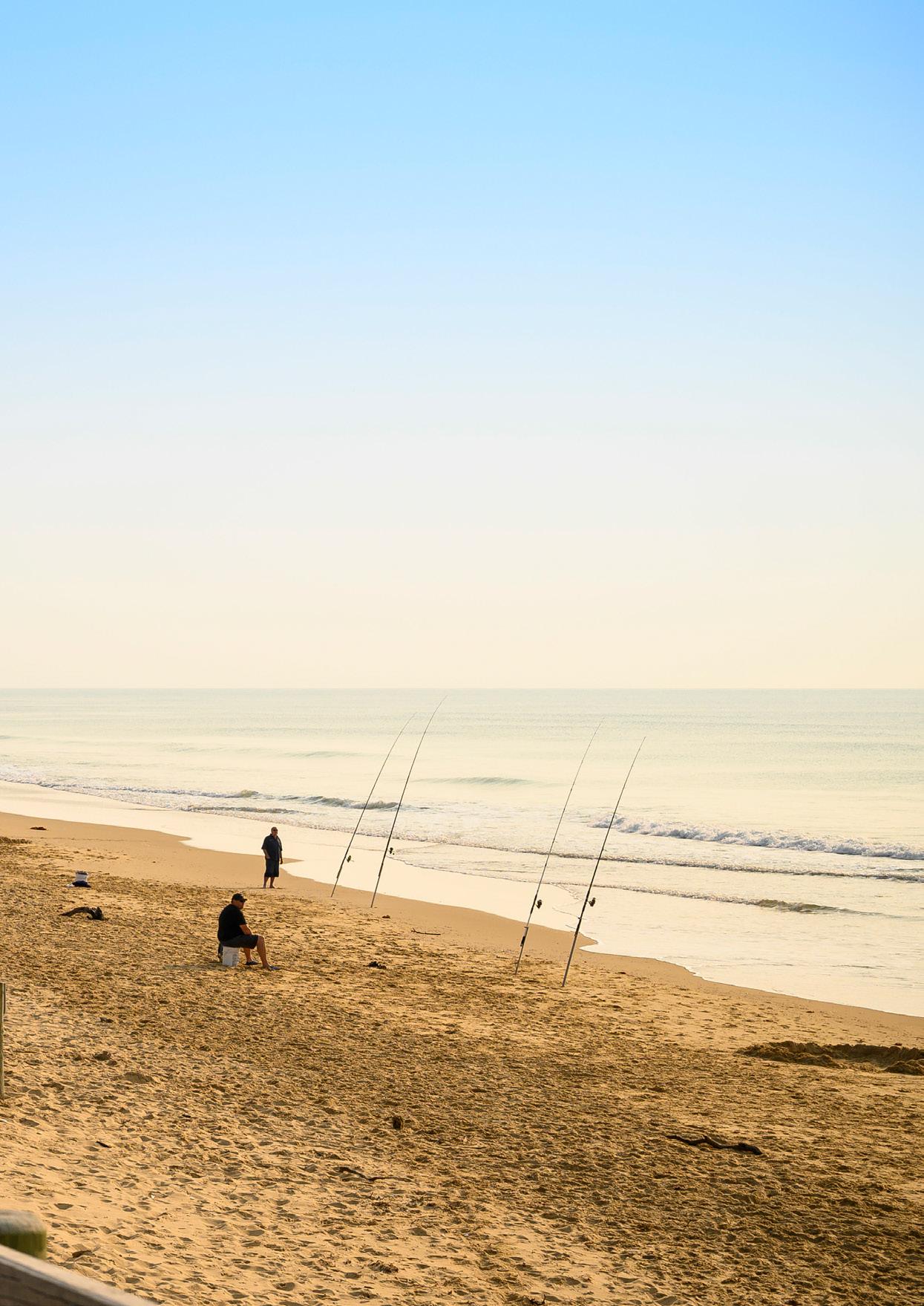
Pop-up health checks in Latrobe
Palliative care gets a boost Latrobe clinic supports smokers to quit
Pilot program streamlines cancer care statewide COVID-19 response
Swifts Creek P-12 Tambo Campus caters for approximately 70 students in Years 7-12 and while total numbers are small, the positive impact of having access to the Doctors in Secondary Schools (DISS) program has been experienced throughout the whole school community.
The doctor and practice nurse attending the school are an integral part of supporting student wellbeing.
Principal, Robert Boucher, said Swifts Creek P-12 school was grateful for the positive impact that the DISS had achieved in the school community. “We are well aware of our small number of students however in percentage terms, a significant percentage of our students have benefited from the introduction of this resource,” Mr Boucher said.
Nine Gippsland secondary schools participated in the Doctors in Secondary Schools program in a partnership between Gippsland PHN and the Victorian Department of Education and Training.
Funding general practitioners and practice nurses to visit secondary schools is one of the ways Gippsland PHN supports people to access services easily, especially where gaps exist and in hard-toreach locations.
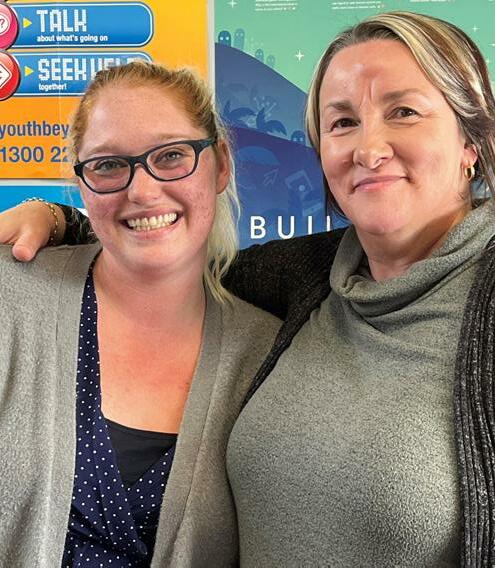
In the past year, general practitioners attended 950 consultations at Swifts Creek School, Bairnsdale Secondary College, Sale Secondary College, Maffra Secondary College, Traralgon Secondary College, Kurnai College, Warragul Regional College, Drouin Secondary College, and Neerim District Secondary College.
Schools were selected based on criteria such as their student population’s specific health and wellbeing needs, their capacity and willingness to build community relationships and their long-term commitment to student health and wellbeing.
Under the program, participating general practitioners provide bulk-billed health services to students. Families do not incur out-of-pocket expenses, and telehealth appointments were available when COVID-19 restrictions were in place.
The program aims to make primary health care more accessible to students, assist young people in identifying and addressing any health problems early, and reducing the pressure on working parents.
“Given the services that exist in our community and the geography of our student population, the program has allowed students to access information and support they were previously locked out of…student agency is so important and the manner in which DISS runs, enables our students to experience this. Knowledge is power and through the DISS our students are empowered.”
Mr Boucher said the students had built a relationship with the doctor and nurse, and know they are being supported in their academic and social skills.
“We have seen the health literacy of our student population grow to further build their skills as independent likeable young adults.”
Practice nurse, Amy Fisher, said DISS allowed students to gain and improve their health awareness, enabling them to be more independent with their life and health choices.
“We have facilitated check-ups, referrals and ongoing care to students living in a remote area with otherwise limited access to a doctor,” Ms Fisher
said. “We have built rapport with the Swifts Creek Bush Nursing Service and worked collaboratively to facilitate individual needs of the students outside of our DISS clinic hours.
“The school has a fantastic wellbeing team who we work closely with to provide supportive and coordinated care to the students.”
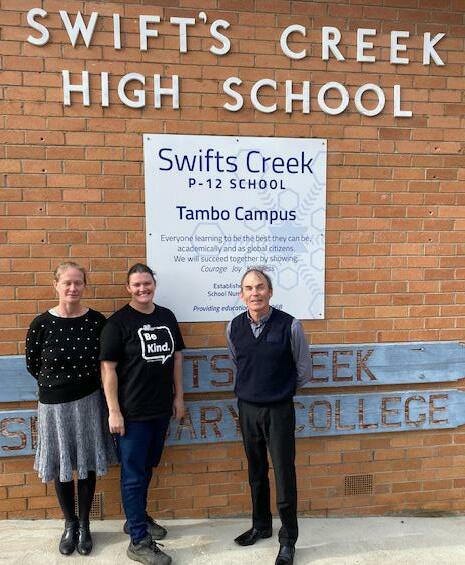
Sport and play proved a successful combination in the Community Recreation Program in East Gippsland.
Funded by Gippsland PHN as part of the Bushfire Recovery Program and delivered by GippSport, the program was designed to improve levels of physical skill in children, psychological confidence and motivation, social connection and cognitive ability in children.
A range of activities, including the Kiddo
Program, family and community events and school holiday programs, were co-designed with local communities. Overall, GippSport partnered with 21 groups in 13 towns and four education facilities with 874 children and 455 families participating.
Outcomes included improved levels of physical skill in children; improved levels of psychological confidence and motivation; improved levels of social connection; and improved cognitive ability in children.
A collaboration between the Royal Flying Doctor Service Victoria (RFDSV) and GippSport at Parents’ Group meetings was well received. While parents networked and received information and resources from the RFDSV outreach worker, GippSport provided activities for the children including the Kiddo program.
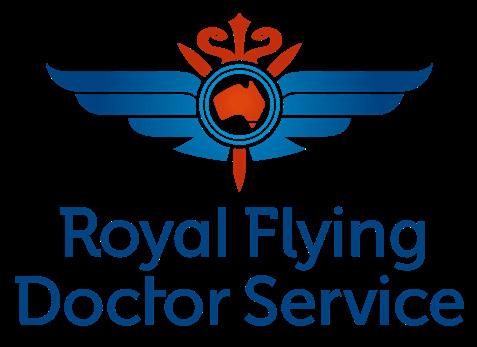
The Swifts Creek Early Childhood Development Centre’s Kiddo program was delivered weekly across the school term with the focus on kicking and balancing skills. Pre- and post-program testing showed an increase in kicking ability by 3.5 metres and balance by 9.5 seconds. Of the pre-tested participants, 100 per cent presented with an increase in their kicking and balancing in their post-test results.

More than 180 Latrobe residents had free health checks in easy-to-access places such as shopping centres as part of a project to promote and encourage regular health checks.
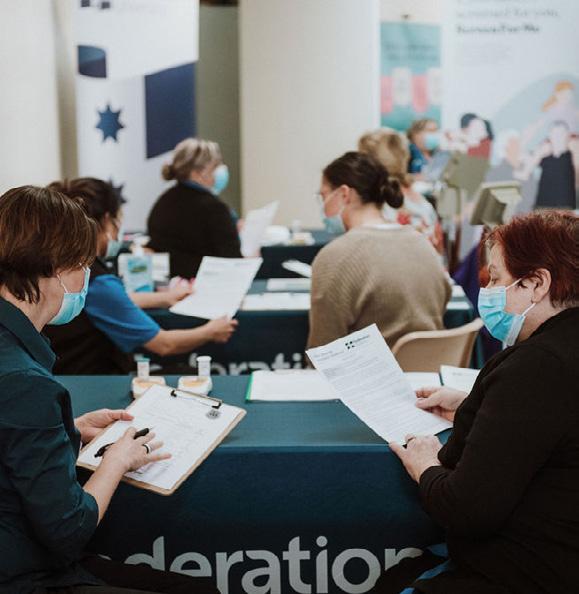
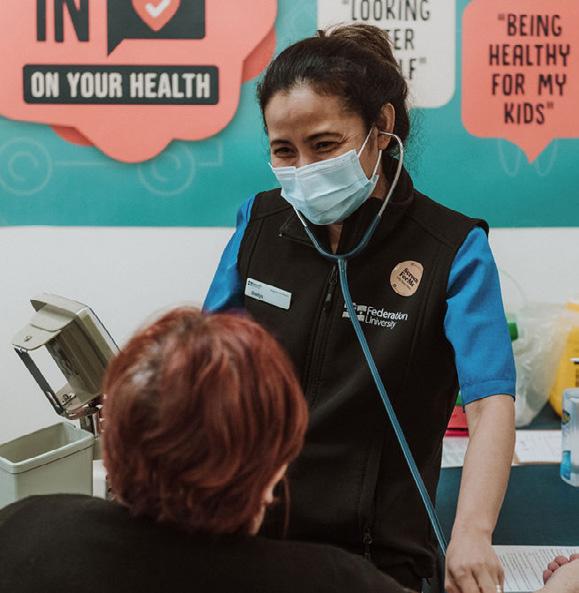
Federation University nursing students did the checks under the supervision of registered nurse academics. They tested blood pressure, pulse, respiratory rate, body mass index, weight, waist measurement, height, blood glucose and cholesterol.
Bookings were not required, so people could drop into the pop-up clinics in high-traffic places like shop fronts and shopping centres in Traralgon, Morwell and Churchill. The non-traditional settings particularly aimed to improve accessibility to people from vulnerable groups.
The project highlighted a need for preventative services that take health checks out of a formal setting, are quick and accessible and do not require access to GPs.
A total of 188 people had a health check as a part of the pop-up clinics with 33 of them encouraged to follow up their results with their general practitioner.
The project followed community feedback that recommended free and low-cost health checks be made available outside of general practice and that nurses could play a greater role. It was commissioned by the Latrobe Health Innovation Zone (LHIZ) Early Detection and Screening, including Tobacco, Initiative.
This free, 15-minute health check helped identify the warning signs of various conditions such as diabetes, heart disease, and some cancers. When found early, treatment may be more successful.
The pop-up health clinics also provided student nurses with the opportunity to put some of their learnings into practice.
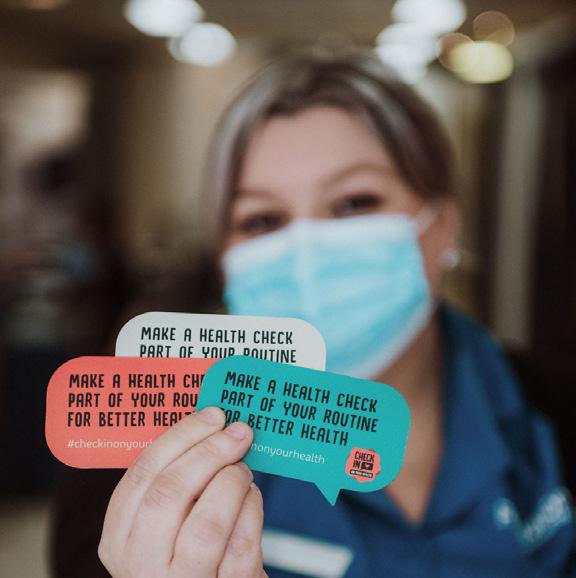
Gippsland PHN’s palliative care coordinator Lauren Sewell (second left) spent a day visiting palliative care facilities in Melbourne in May 2022. She was part of a group of Latrobe Valley health representatives.
Gippsland PHN’s palliative care coordinator Lauren Sewell spent a day visiting palliative care facilities in Melbourne in May 2022.
Lauren joined representatives from the office of the Latrobe Health Advocate and Latrobe Regional Hospital during a visit to the Caritas Christi Hospice and the new palliative care ward at the Peter MacCallum Cancer Centre.
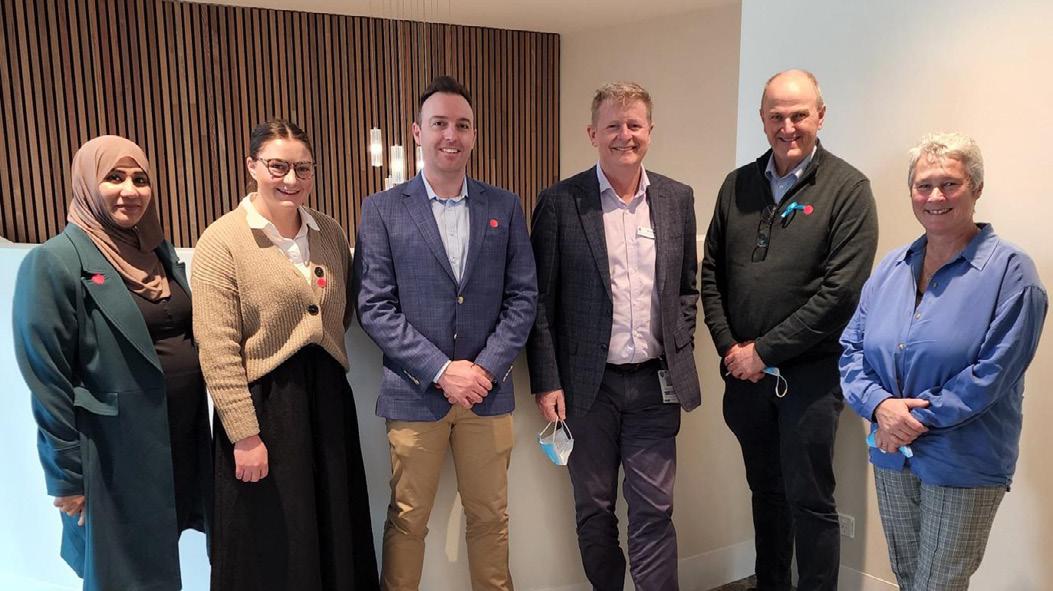
Gippsland PHN is working to improve access to and quality of palliative care, particularly palliative care in the home.
The visit provided an insight into ways high-quality palliative care can be replicated in the home and delivered in an accessible way.
“We are focusing on the needs of the Gippsland residents who are accessing palliative care and keeping them front of mind as we work to improve and deliver local services,” Lauren said.
The visits also provided an opportunity to strengthen relationships between regional and metropolitan services and to see firsthand the difference a dedicated environment for end-of-life can make.

Smokers in Latrobe had an opportunity to attend free face-to-face clinics as part of a pilot project to assist them in cutting down or quitting smoking.

The Latrobe Smoking Support Service ran for six months, from September 2021 to March 2022. A total of 117 people attended the clinic at least once, with 432 consultations. Most clients attended three or four times.
The project was run by Latrobe Community Health Service and funded through the Latrobe Health Innovation Zone Early Detection and Screening, including Tobacco, Initiative. It is one of the ways Gippsland PHN is partnering with stakeholders to deliver local services.
More than 80 per cent of clients completed a sixweek follow-up survey and reported that the clinic had helped them change their behaviour and either reduce or quit smoking.
On average, clients reported they had reduced the number of cigarettes they smoked each day over six weeks, and 20 clients had quit altogether.

The percentage of people smoking 21 to 30 or more than 30 cigarettes per day fell after the second visit, indicating it may take only two sessions to change smoking behaviour.
Clients were also asked to rate the impact of the smoking clinic. All measured aspects of the clinic scored very highly. This included making clients feel more confident to quit, increased awareness of the products and services available to help people quit and the benefits of quitting.
The evaluation found the project was successful with identified strengths, including the support provided by the counsellor and practitioners, provision of nicotine replacement therapy vouchers and education delivered by a trusted source. Ongoing support and counselling provided locally, either face-to-face or by telephone, were also important.
Gippsland PHN is leading a statewide Cancer Shared Care program to better support people affected by cancer.
Funded by the Victorian Department of Health, the pilot program is developing models of shared cancer care in Gippsland, Western Victoria and the Murray. Each will be tailored to meet local needs.
Gippsland PHN has partnered with Latrobe Regional Hospital to develop the shared care model, piloted in partnership with local primary care providers.
The program is designed with input from general practitioners, practice nurses, cancer care providers, and consumers to ensure that cancer survivors have access to high-quality cancer care.
The pilot program will streamline cancer care pathways, putting the patient at the centre of care decisions.
Cancer Shared Care is about improving patient outcomes and ensuring that all people diagnosed with cancer receive the best care, irrespective of where they live or receive cancer treatment.
A person’s cancer experience does not necessarily end when the treatment does. Shared cancer follow-up is essential after active treatment to check whether cancer has returned, discuss physical and emotional health, and monitor the treatment’s risk factors and side effects.
Gippsland PHN provided funding to support and coordinate local, innovative, short-term solutions to increase in-reach COVID-19 vaccination services to vulnerable populations or individuals.
Latrobe Community Health Service was commissioned to identify and vaccinate these cohorts who could not access the vaccine through existing mechanisms or did not want to attend vaccination sites.
From November 2021 to 30 June 2022, 469 vulnerable people in Gippsland were vaccinated, including in-home vaccination for people who were housebound, had a disability, were homeless or lived in rural and remote areas. Locations visited included caravan parks, libraries and neighbourhood houses.
Gippsland PHN also supported the Gippsland Region Public Health Unit to provide vaccination outreach services at Morwell Neighbourhood House and the Carry On Café in the Morwell Central Business District.
A total of 175 vaccinations were administered at these locations.
The Gippsland Region Public Health Unit administered COVID-19 vaccinations in the premises next door to the café while Gippsland PHN provided everyone vaccinated with a free coffee at the café.
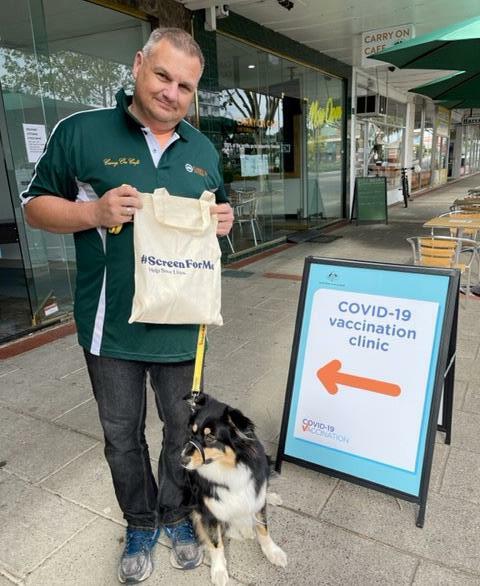
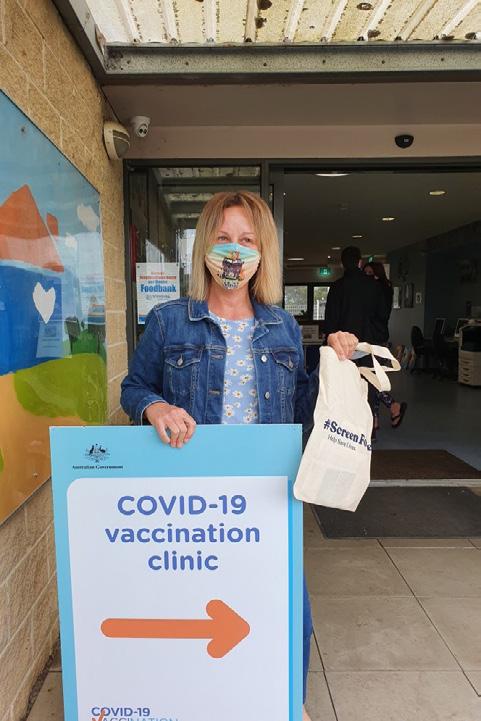
The café is a social enterprise that supports defence force veterans.
It is important for vulnerable people to be vaccinated where they feel “safe and comfortable”, according to Morwell
House Manager, Tracie Lund.
“Because we have a relationship with people who come to the Morwell Neighbourhood House, we can talk to them, they trust us,” Tracie said. “We can troubleshoot those barriers some people may have and try and combat misinformation.
“Some people have genuine fears (about vaccination). We are here to support them.”
The Morwell Neighbourhood House hosted five sessions. The vaccination team from the Gippsland Region Public Health Unit administered the vaccines while Gippsland PHN provided free healthcare information, a pop-up coffee van and a barbecue.
Two major campaigns rolled out by Gippsland PHN in 2021-2022 were Managing COVID-19 at Home and After-Hours Medical Support.
The Managing COVID-19 at Home campaign provided the Gippsland community with information on how to manage COVID-19 at home if their symptoms were mild. It focused on getting the right support for recovery from COVID-19 and also to match the symptoms.

The video recorded 5,400 views between February 2022 when it was launched, and 30 June 2022.
Watch it Here
The After-Hours Medical Support campaign was developed to create awareness in the Gippsland community of accessing after-hours medical support when their usual general practice was closed.
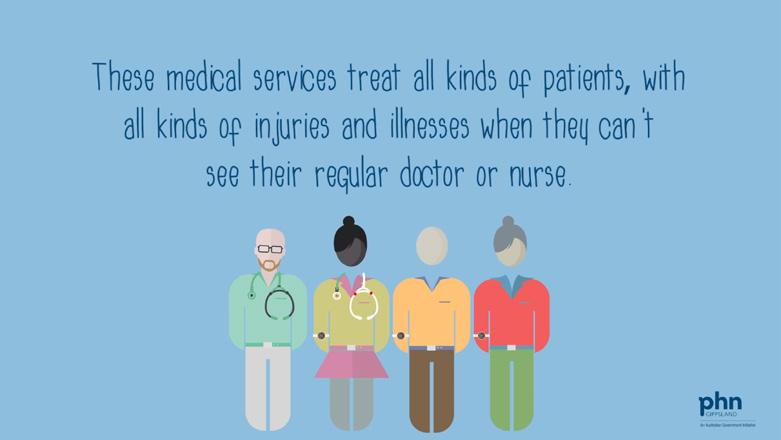
The video recorded 1,100 views since it was launched in April 2022, and 30 June 2022.
Watch it Here
Six Gippsland doctors featured in Gippsland PHN’s major vaccination campaign - ‘It Starts With You’.
The campaign gave the doctors the opportunity to speak to those people in their community who may be hesitant about having the COVID-19 vaccines, advising people with questions to discuss them with their trusted local doctor.
Gippsland’s doctors have been a key part of the Australian Government’s vaccination rollout with regional GP clinics and respiratory clinics playing a major part in vaccinating the community.
General practitioners, Dr Louise Sterling from Warragul, Dr Suzi Mikhail from Traralgon, Dr Kingsley Rajasingham from Moe, Dr John Hambly from Paynesville, Dr Lloyd Waters from Sale and Dr Sema Yilmaz from Bairnsdale, featured in a video where they urged people to “follow the science,
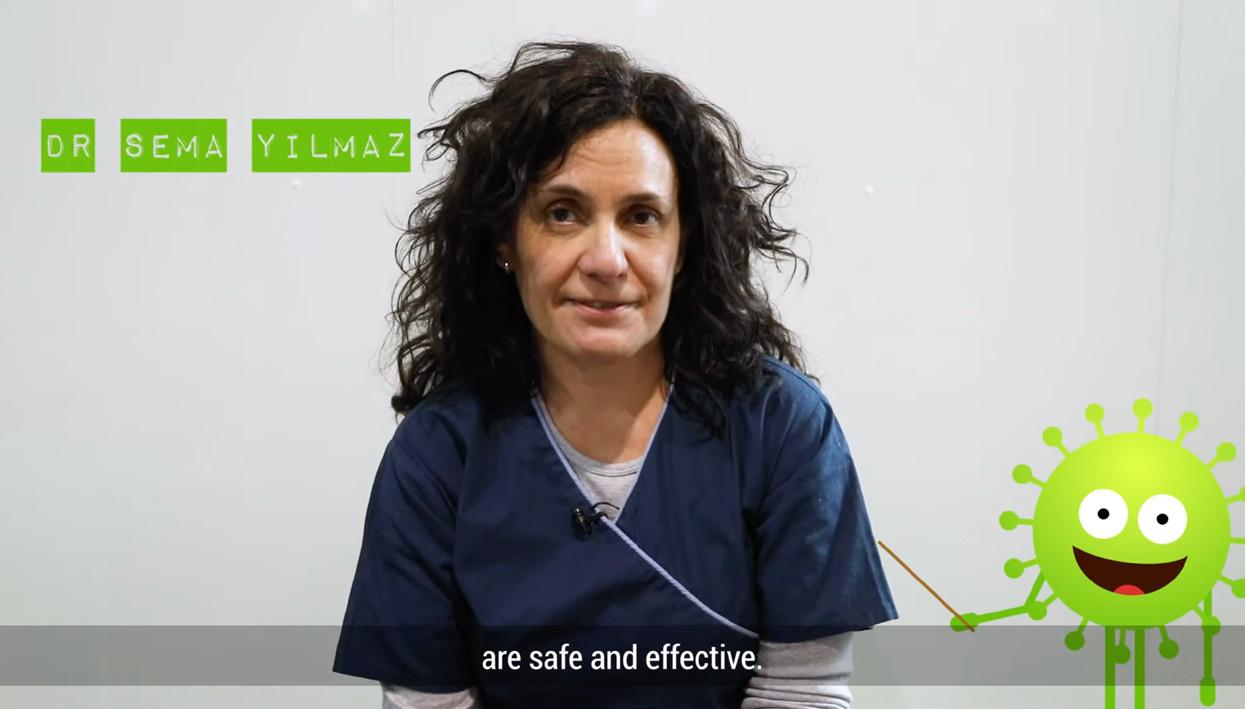
“
“
We know some people are hesitant about getting the COVID-19 vaccine and we get it
Dr Louise Sterling
“
“ People need to get the vaccine that is available to them now. Our future depends on it
Dr Kinglsey Rajasingham
“
“
Please speak to us; we are your local trusted doctors and can answer your queries
Dr Suzi Mikhail
not the myths”.
People having trouble finding their vaccination certificate or linking it to the Services Victoria app were able to seek help from the Vaccine Helpers program, funded by Gippsland PHN.
Latrobe City, South Gippsland and Wellington Shire councils delivered the program through their libraries and community centres to assist people having trouble with the process. In Latrobe, 221 people were assisted, in South Gippsland 64 and in Wellington 66.
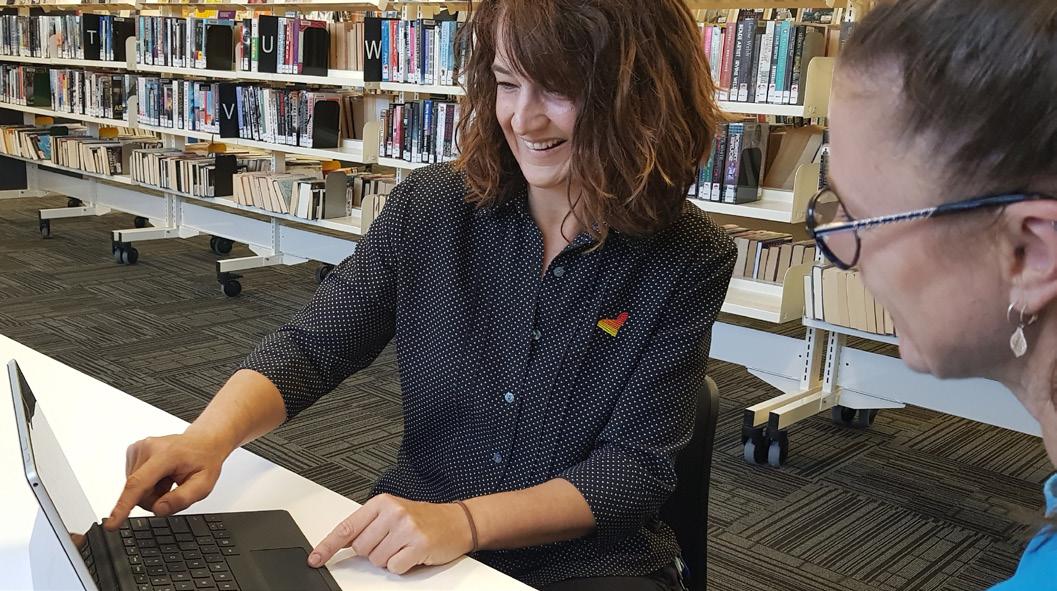
Some people sought help to create their MyGov account, set up their Medicare app, download their vaccination certificate, link their vaccination status and even print out a hard copy of their proof-ofvaccination, which is then laminated.
Members of the community were also assisted to book vaccine or booster appointments and the program made it easier for people to find answers to Government vaccination requirements. It helped them overcome barriers to accessing government services, particularly around technology.
With a surge in COVID-19 in Victoria in February 2022, high case numbers and hospitalisations, healthcare workers needed support and encouragement.
Gippsland PHN joined a Latrobe Valley focused campaign with the Latrobe Health Assembly called ‘Support a Healthcare Worker’.
The aim of the campaign was to acknowledge the efforts of healthcare workers who were working long shifts, caring for the most vulnerable community members and getting very little respite.
Latrobe Regional Hospital, Latrobe Community Health Service and Maryvale Private Hospital also supported the campaign.
Through an online platform, the community could show their appreciation by treating a healthcare worker to a free cuppa along with a kind message of support.
Gippsland PHN modified the campaign region-wide, asking the primary care sector to send a “thank you” to staff.
Pictured enjoying a coffee as part of the campaign was Kristine from The Healthcare Centre in Morwell.


After more than two years of dealing with the impacts of COVID-19, practice managers and general practice staff, including GPs and nurses, have reported fatigue and challenges in their teams.
The Gippsland PHN General Practice Wellbeing Grants were a small acknowledgement of the pandemic's impact on these frontline workers.
Forty-two general practices across Gippsland have benefited from General Practice Wellbeing Grants, which aim to boost morale and connectedness among general practice staff.
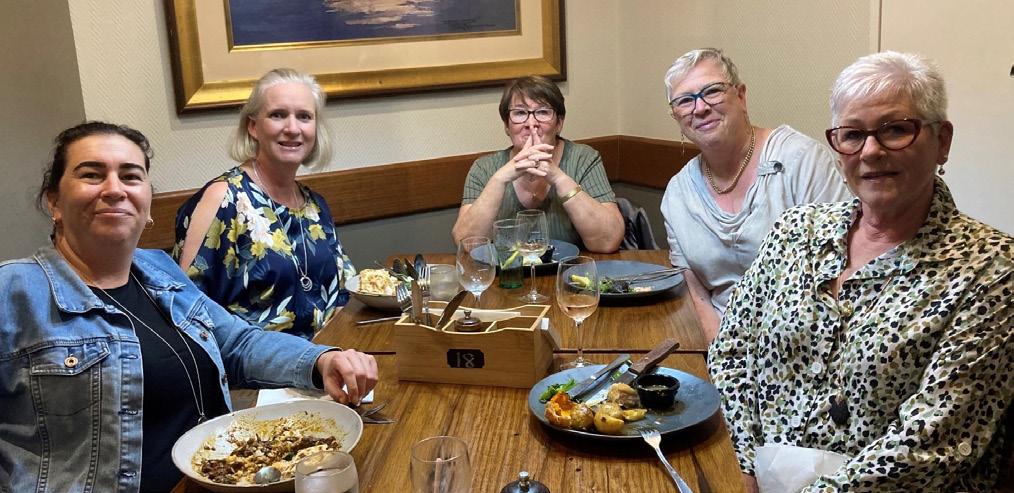
The grants support general practice clinics to fund staff activities or events that promote wellness, social connectedness and resilience.
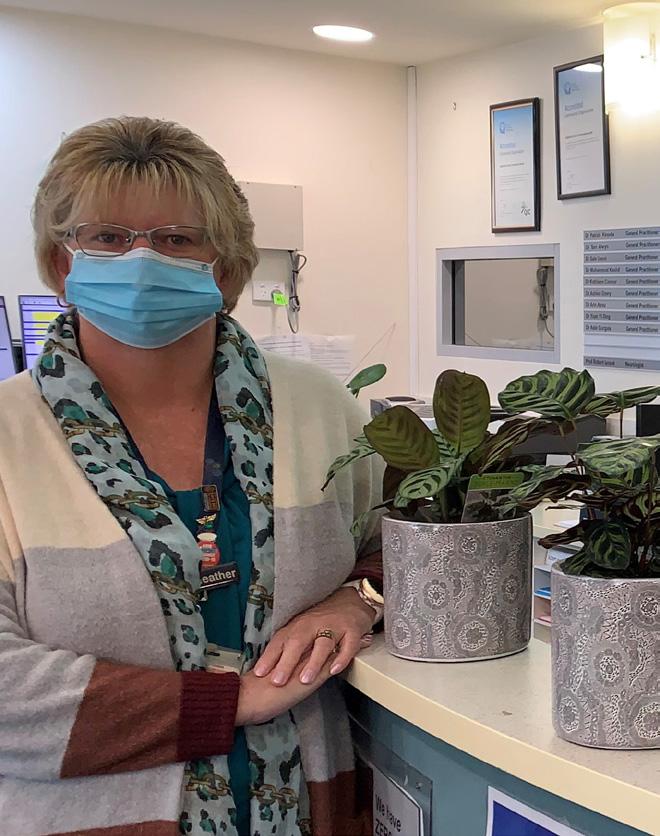
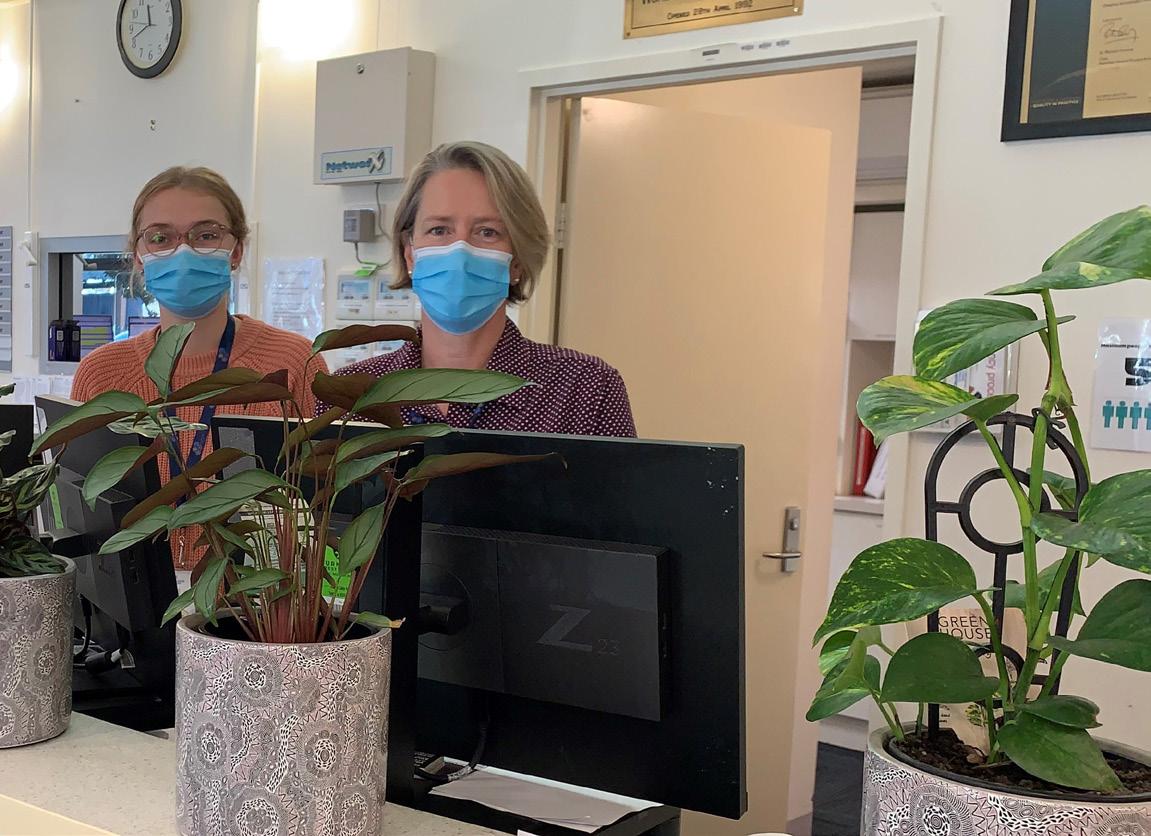


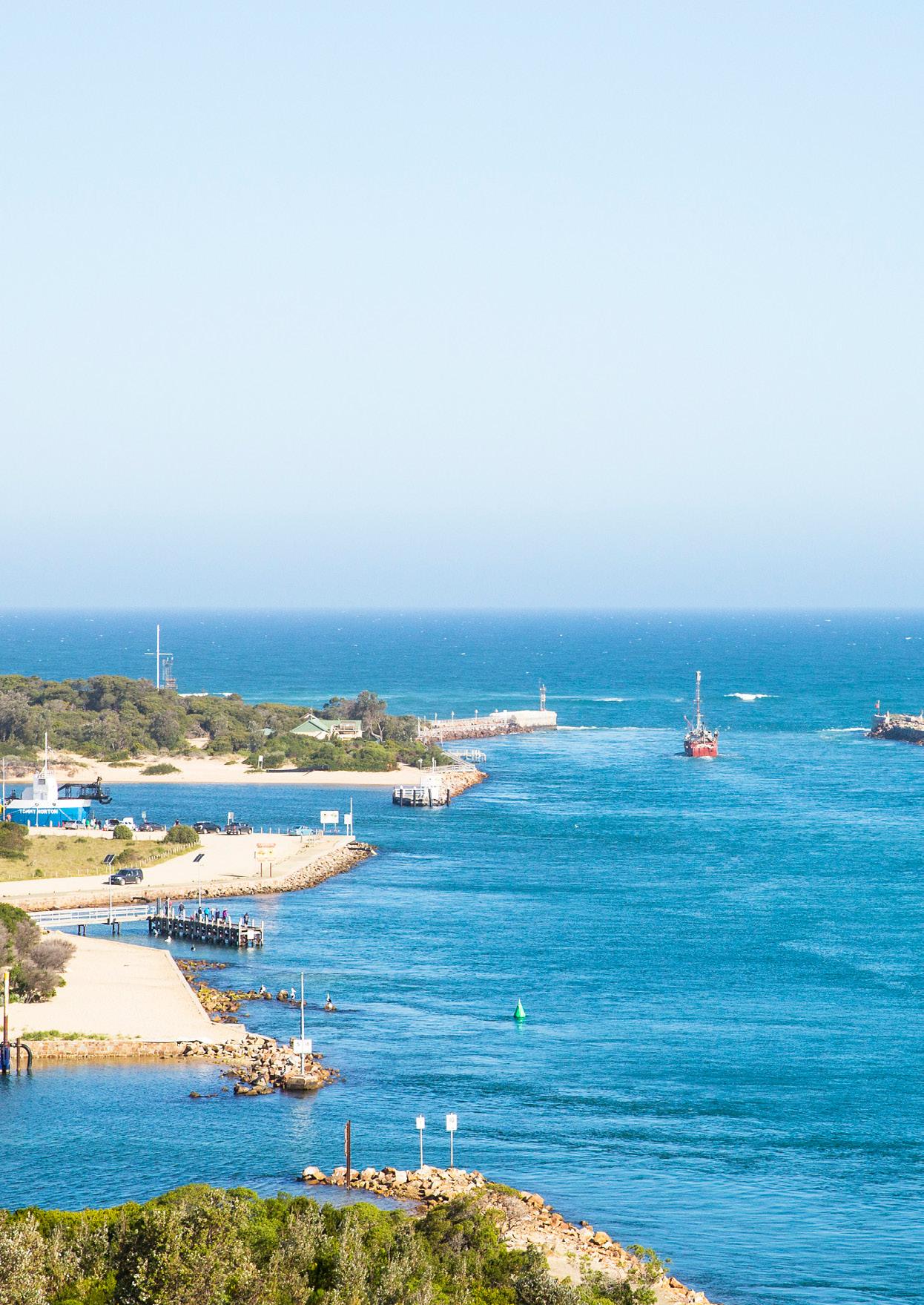
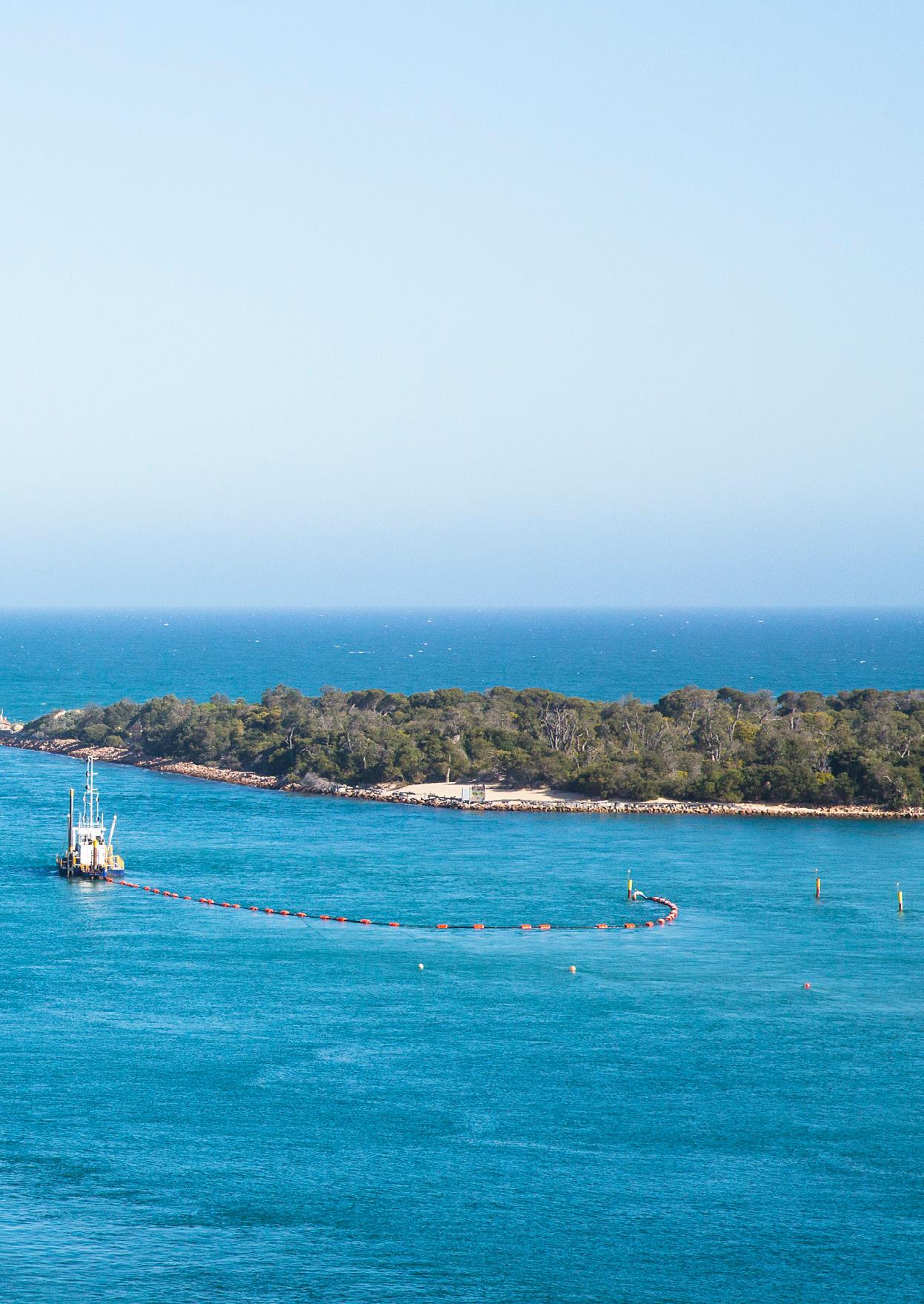
Research
has found it can lead to:
• a 28% decrease in demand for general practitioner services
• increased patient self-esteem and confidence, improved mental wellbeing and positive mood, and reduced anxiety, depression and negative mood
• a 50% reduction in emergency department presentations
• increased connection to community and reduced social isolation.

Gippsland health professionals have embraced an innovative digital platform called ‘Kaleidoscope’ to improve community health and well-being as part of Gippsland PHN’s Digitally Enabled Social Prescribing project.
Social prescribing works by enabling general practitioners, practice nurses and other healthcare professionals to connect people with social, therapeutic and practical support in their area.
By using the online platform, health professionals can co-design care plans with patients, supporting patients to own their health and wellbeing goals. Kaleidoscope’s online platform provides a non-medical referral option complementary to existing clinical treatments to improve health and wellbeing by addressing a person’s social needs.
There are 12 health services in Gippsland using ‘Kaleidoscope’, including 10 general practices.
So far, health professionals have co-designed a care plan in Kaleidoscope with 30 patients in Gippsland, with the most commonly identified social prescriptions those that support exercise, diet and nutrition, and many that enhance social inclusion and connectivity. The largest user in Gippsland is Neerim South Medical Centre, who has developed care plans together with 13 patients and helped them achieve their goals.
People using Kaleidoscope have been supported with advice, direction and support to seek information from websites and factsheets relevant to their goals, directed to mobile health apps to support their care and have been referred to community groups.
Social prescribing shifts the focus from illness to wellness by taking a holistic approach tailored to an individual’s needs.
• COVID-19 Primary Care Management
• Antenatal Care
• Non-urgent Mental Health Referrals
• COVID-19 Initial Assessment and Management
• Anxiety and Depression in Adults
Gippsland HealthPathways has 520 localised clinical, referral and resource pathways available to support local health professionals.
This includes an online portal for use at the point of care, guiding best-practice assessment and management of common medical conditions, including when and where to refer patients.
The pathways provide doctors, nurses, and allied health professionals quick and easy access to up-to-date information on various clinical areas and a directory of local medical specialists and other health professionals. They cover subjects such as antenatal care, cardiology, child and adolescent health, diabetes, mental health, and obesity management.
Gippsland PHN has established clinical working groups to inform local priorities for HealthPathways.
In addition, Gippsland PHN engaged regularly with local health professional representatives on the Gippsland clinical councils to support pathway priorities.
The working groups engage with health services, hospitals and community and primary healthcare providers to identify local barriers and enablers to patient care in Gippsland.
Gippsland PHN also works with Gippsland health professionals to develop localised clinical and referral pathways, consulting with more than 60 stakeholders throughout the year.
During 2021-22, the HealthPathways team developed 40 new clinical pathways, supported 191 new health professionals with access to the site and saw 15,000 pathway page views by health professionals in their care of patients in Gippsland.

Gippsland HealthPathways transitioned to a new and improved HealthPathways platform which supports mobile technology, ensuring local health professionals can access valuable pathway information on any electronic device.
The platform incorporates the same clinical guidance but with a clean, contemporary design and added features to make accessing HealthPathways easier and better-suited to users’ varying contexts. The responsive design means the content shifts and adjusts depending on the device being used (desktop computer, laptop, tablet, or mobile device).
The TOP 5 most viewed pathways for 2021/22 were
You can watch the benefits of Lifeguard in this video.
Gippsland doctors were given access to a new program to remotely monitor COVID-19 positive patients in their own home, thanks to a Gippsland PHN initiative.
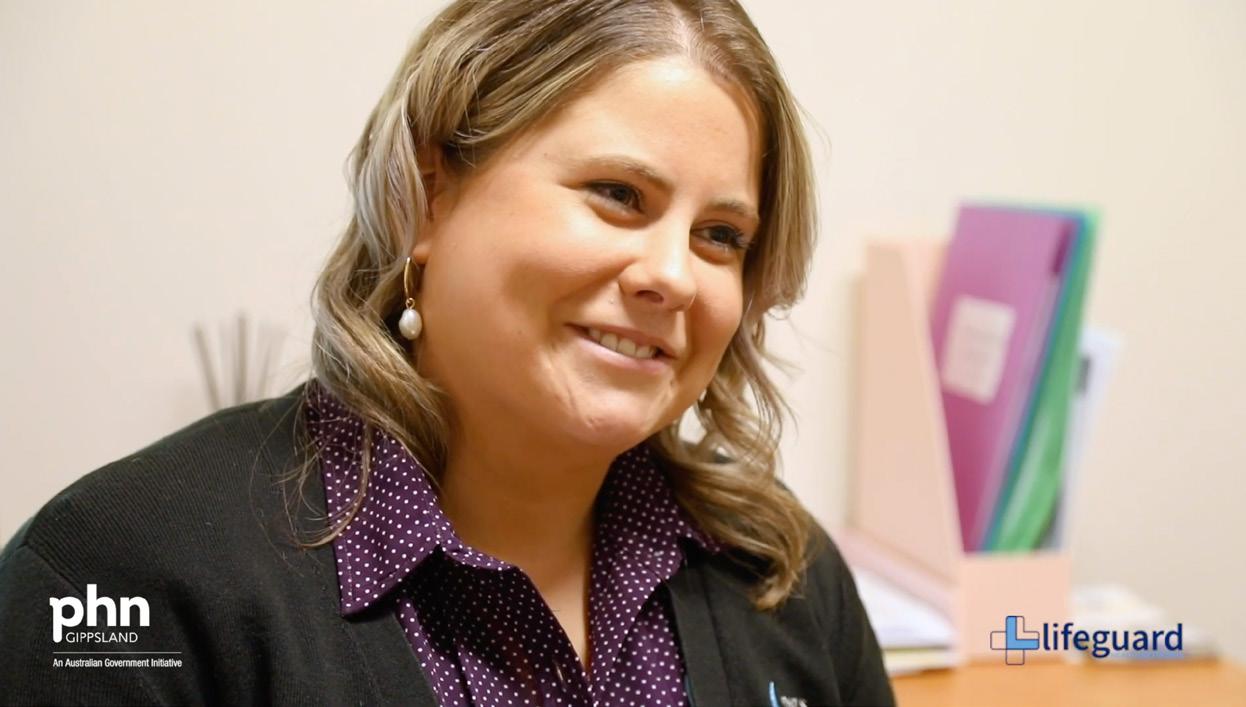
The new pathway of care was designed to assist general practices effectively and efficiently manage appropriate COVID-19 positive cases.
Gippsland PHN provided start-up funding to 34 Gippsland general practices to enable them to use Lifeguard. As well as reducing pressure on hospitals, the initiative brought comfort to low-risk patients who could be monitored without going to hospital.
Lifeguard enables health professionals to easily monitor the health status of multiple patients at once, including the ability to detect patient deterioration early. People in the program enter data into the remote monitoring app daily. Care coordinators monitor all patients via the app system and if a participant reports outside their threshold, it triggers an alert on the system.
We
Lifeguard to remotely monitor
who are COVID
GP lead at Inglis Medical Centre in Sale, Dr Yousuf Ahmad said.
They download the app on their phone and input their vital information three times a day. These are then monitored by the Lifeguard care coordinator. If there are any changes, these are detected immediately, and the patient is escalated to see a GP.”
“
“
“ “
use
our patients
positive the
Bush nursing centres and health services in remote communities of East Gippsland are using technology to enhance care for their patients.
While the services deliver regular face-to-face appointments, they are also monitoring their patients through the Lifeguard software platform.
The DigitalCare@Home program is a joint venture between Royal Flying Doctor Service (RFDS) Victoria and Gippsland PHN to make Lifeguard available to participating health services in Gippsland, including bush nursing centres, to remotely monitor their patients through the Lifeguard application and catch signs of deterioration early, before the patient’s situation becomes urgent.
Participants with chronic disease such as respiratory or cardiac conditions and diabetes simply use a mobile app to enter health data on a daily basis. The data is monitored by bush nursing centre staff and if a participant reports a change in their condition, an alert is triggered on the system and the health service is notified.
Through this immediate response, the DigitalCare@Home remote patient monitoring program can help to prevent unnecessary hospitalisation.
Manager of the Buchan Bush Nursing Centre, Anne Brewer, said her local community was still struggling from drought, fires, floods and COVID.
The bush nursing centre is at the heart of the community; Anne loves the autonomy her role provides, the variety and making a difference to people. “We look after people from the cradle to the grave,” she added.
An important part of her job is preventative medicine as well as curative. Digital tools, such as Lifeguard, mean patients have choices, dependent on mobile phone reception and internet capabilities.
“We are gradually increasing the number of patients who are comfortable with remote patient monitoring using Lifeguard,” Anne said. “It has worked well for those patients who are happy to use it. It is great for monitoring things like blood pressure, diabetes and respiratory disease among others.”
Susie Edwards from the Gelantipy Bush Nursing Centre has four clients currently using remote patient monitoring with Lifeguard weekly to input their blood pressure details.
Aged between 34 and 72, Susie worked with the clients to develop a care plan and then helped them to download the Lifeguard app to their mobile phones.
“They all feel very reassured that they are being monitored regularly,” she said. “If anything changes, they get an alert and so do I. We then determine what may have caused the change and take any action needed.”
Susie has been working at the Gelantipy Centre for 10 years and said remote monitoring using Lifeguard gave clients another option in terms of their care.
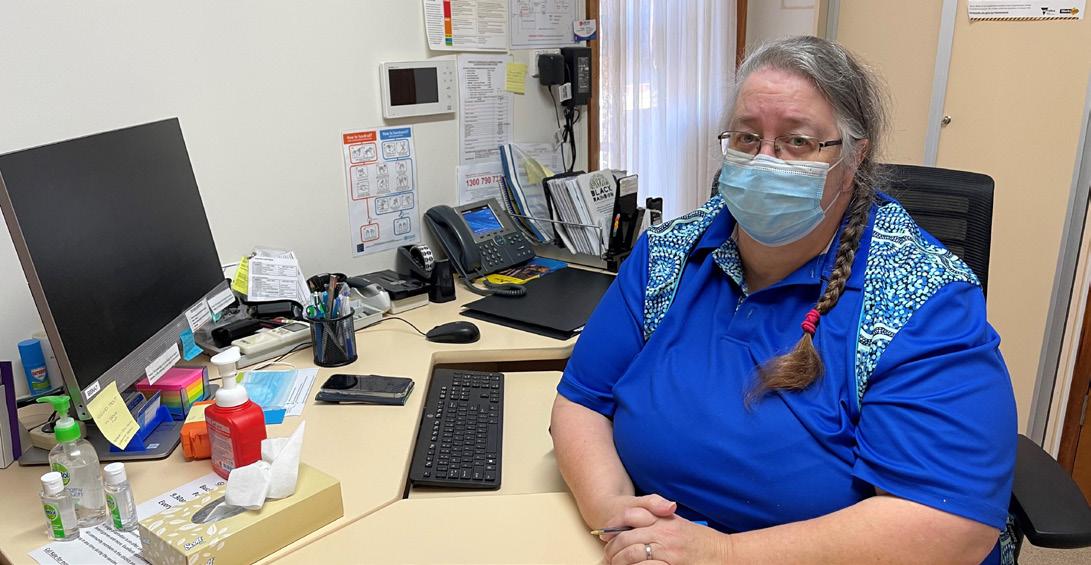
My Health Record is a safe and secure place for Australians to keep their key health information, and is available to healthcare providers whenever it’s needed, including in an emergency.
Key health information like immunisations, pathology and diagnostic imaging reports, prescription and dispensing information, hospital and discharge summaries and more, all in one place.
Gippsland PHN has worked closely with health providers in the region, supporting 96 per cent of general practices with clinical software upgrades that improved security, protection and access to My Health Record.
Digital health literacy training sessions were provided for general practices on My Health Record, ePrescribing and other Australian Government digital health initiatives.
Engagement activities aimed at increasing awareness, registration and increased use of My Health Record by Gippsland community health organisations and specialists were undertaken, all designed to provide benefits for the Gippsland community.
In total, 201 Gippsland healthcare organisations are registered for My Health Record, an increase of 24 from the last financial year, including 75 general practices, 76 pharmacies and five hospitals.
theMyHealthRecordhaschanged wayIthinkabouthealthcare.It (thesystem)isstreamlinedtohelp patientsandhealthprofessionals. Insteadofchasingresults,theyare inoneplacewhereIcanaccess them at all times.
Iwasunsureabout MyHealthRecord, however,thedoctor explaineditallto meandshowedme howIcouldaccessit throughmyMyGov account.
Facetime allows my doctor to see how I’m looking on days that I can’t go into the clinic. This is very reassuring, as one of my conditions is skin related, and needs to be checked visually.
ePrescribing enables me to always have my scripts on hand if I am away from home.
Having a care plan enables me to access a physiotherapist, which I would otherwise not be able to afford. I am also reviewed every six months, which monitors my progress and we can make changes if necessary.
When my doctorexplained what MyHealth Record offered, Iwanted to ensure that Ihave it, as I travel a lotand wanted to ensurethat my records couldbe easily accessed ifrequired.
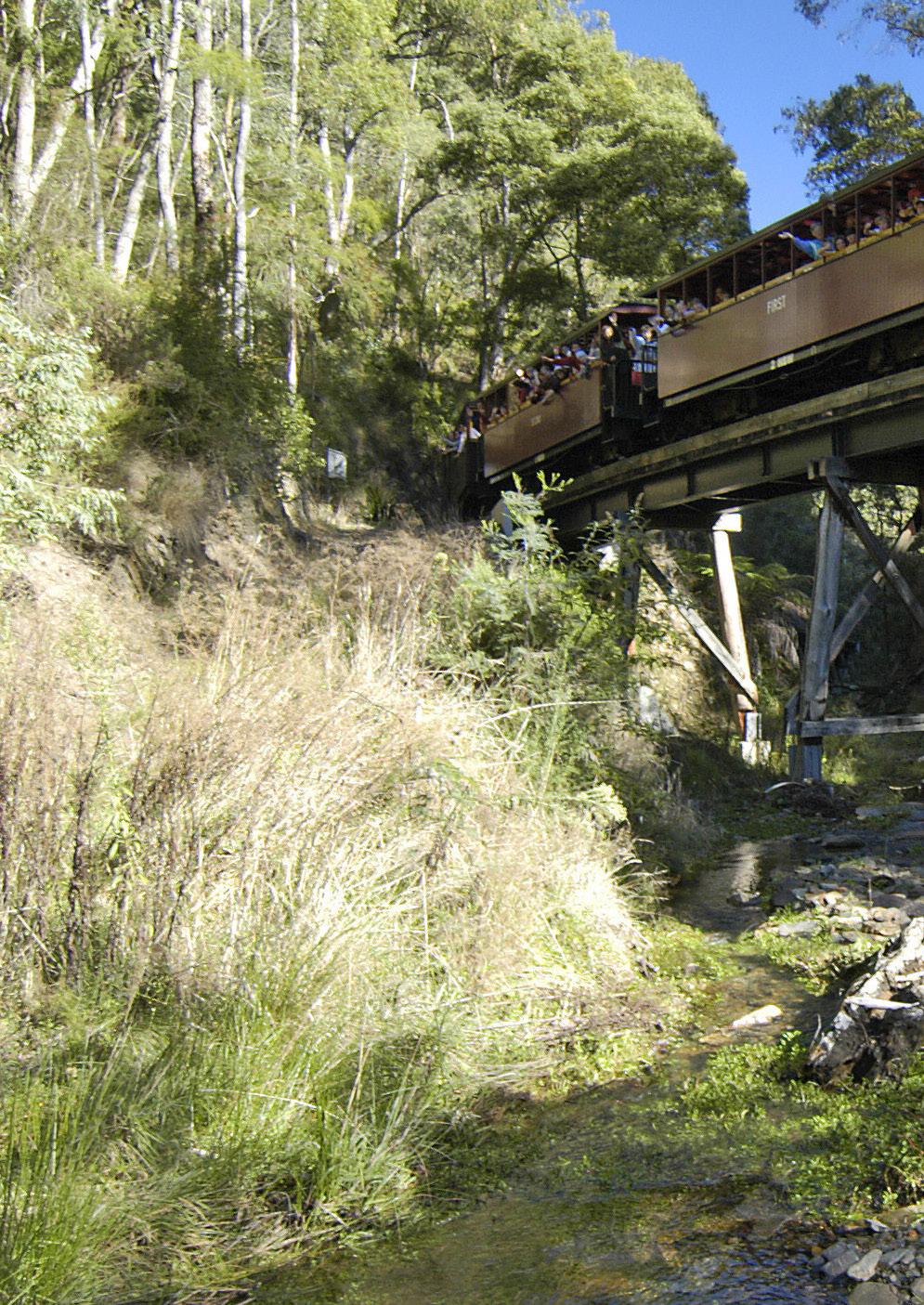

identify priority areas.
work with our partners towards our vision of a measurably healthier Gippsland.
care that meets needs workforce health and other drugs disease health and wellbeing suicide prevention Reproductive and sexual health and Torres Islander health and and young people years) aged 65 and over with a disability
A comprehensive study has painted a detailed picture of Gippsland’s health and wellbeing.
Gippsland PHN’s Health Planning, Research and Evaluation team gathered data from people across Gippsland through surveys, interviews and workshops in 2021, then analysed the data to identify priority areas.
The Health Needs Assessment 2022-2025 builds on previous analysis using recently released data, stakeholder input and lessons from program monitoring and evaluation. The report captured community feedback and provided data on issues such as prevention, better health services, health issues and community support.
People in Gippsland reported their experience across a range of areas, which is important to identifying any service gaps.
Population health planning is an ongoing activity at Gippsland PHN, with the Health Needs Assessment a significant part of this work. This information will now be used to work with our partners towards our vision of a measurably healthier Gippsland.
The Health Needs Assessment revealed total life expectancy for people in Gippsland is 80.6 years, with females living for 83 years and males 78.9 years. This compares to a national life expectancy of 82.5 years, comprising females at 84.6 years and males at 80.5 years.
Coronary heart disease is the leading cause of death for both men and women in Gippsland, while cancers rate among the top causes of death with a mortality of 184 per 100,000 people (167 in Australia).
The data is provided to the Commonwealth Government.
• 10.9% children have emotional or behavioural problems at school entry compared with 8.1% in Victoria.
• 46% of the activity at Gippsland GP practices in 2019-20 was for people aged 65+. The most common diagnosis was hypertension, affecting 53% of people aged 65+.
• The most common active disability diagnosis in general practice was autistic disorder
• In 2020-21, 20% of general practice activity was after hours compared to 16.9% in 2019-20.
• Psychologists working in the primary care or community setting across Gippsland have decreased by 15.7 Full Time Equivalents between 2015 and 2019.
• Factors affecting health (social determinants; housing, income, social connections, education): 20.7% of school leavers participated in higher education in Gippsland (39.3% in Victoria).
• Family violence: Gippsland experiences high rates of family violence incidents, including some of the State’s highest rates in Latrobe, East Gippsland and Wellington.
• 17% of all Gippsland general practice patients had an active mental health diagnosis in 2020-21. The most common mental health diagnoses in general practice were depression (10.9%) and anxiety (7.9%).
• More than 65% of people in Gippsland consumed alcohol at levels likely to increase lifetime risk of harm (>2 standard drinks per day) (59.5% in Victoria).
• 0.5% of all general practice patients had an active dementia diagnosis, increasing by age to 3.1% of patients 75 years or older.
(21.4% of all disability diagnoses), followed by intellectual functioning disability (11.2%) and dementia (9.4%).
• Chronic disease management, mental health and wellbeing, and socioeconomic determinants of health such as employment and housing were identified as key issues for Aboriginal and Torres Strait Islander people.
• 27% of general practices were enabled to use videocalls for telehealth appointments in 2021, a 50% improvement since 2020.
• Healthy and safe environment: A total of 1,717 people were seen at Gippsland HeadtoHelp (now known as Head to Health) hubs funded in response to the Victorian COVID-19 pandemic between September 2020 and 2021.
• Over 30% of adults in Gippsland report more than one chronic disease, compared to 25.5% in Victoria.
• Cancers rate among the top causes of death in Gippsland with a mortality of 184 per 100,000 people (167 in Australia).
• The most common reason to seek advice from a GP for reproductive health was oral contraception (9.9% of all reproductive health diagnoses), followed by enlarged prostate (9.2%) and heavy periods (6.8%).
See the full report at: https://gphn.org.au/what-we-do/health-planning-research-andevaluation/population-health/our-priorities/
Abortion Abortion can either be a medical (by taking tablets, up to nineweeks) or surgical termination of pregnancy. In Victoria, it islegal to have an abortion up to 24 weeks of pregnancy and incertain situations, beyond this. In Australia it is estimated that half of all pregnanciesare unplanned and half of those will be terminatedBetween one quarter and one third of Australianwomen will experience abortion in their lifetime
have ever been pregnant have had an abortion; 10.5% had a medical termination 17.6% had a surgical termination
Chlamydia is the most common STI in GippslandHigh rates in Baw
Gippsland PHN produces eight Priority Issues Papers a year as part of its commitment to understanding and investing in priority health issues.
The Priority Issues Papers help Gippsland PHN progress its priority issues by presenting data on health issues and available services related to the priority health issue in Gippsland.
The papers help raise awareness of health and wellbeing needs in the region and are promoted through local media, Gippsland PHN newsletters, and Gippsland PHN advisory groups.
In the past year, Gippsland PHN published papers on child health, the Gippsland PHN Health Needs Assessment - data snapshot, family violence, sexual and reproductive health, alcohol and other drugs, oral health, dementia and suicide.
Gippsland PHN gathers data and information from many sources, including the local community and health professionals, to identify local health priorities.
It helps the organisation make informed decisions about the best way to achieve its vision of a measurably healthier Gippsland.
The Integrated Team Care Program (ITC) is helping Aboriginal and Torres Strait Islander people with complex chronic diseases that are unable to effectively manage their conditions through access to one-on-one assistance by care coordinators.
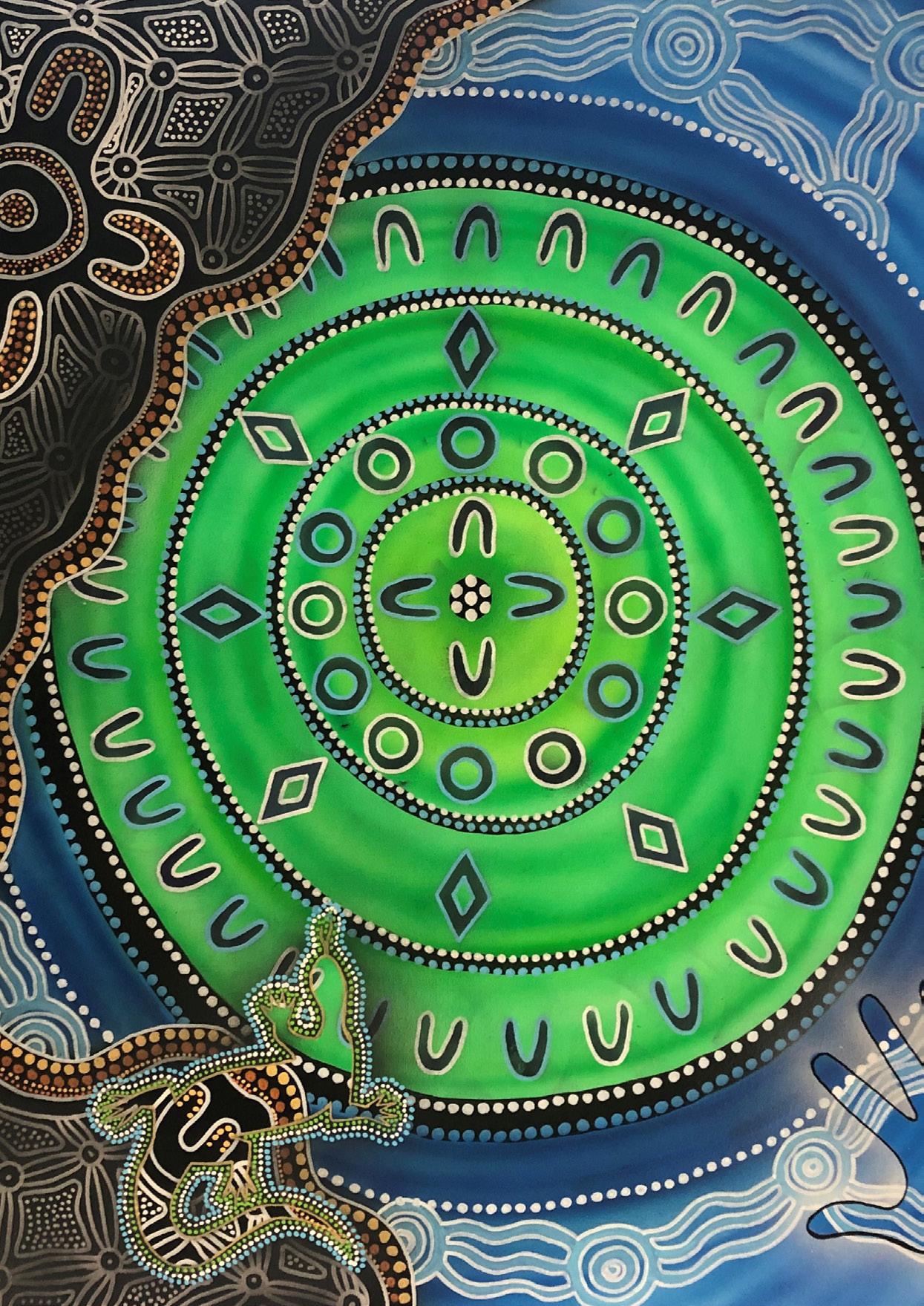
Since the establishment of the ITC, the provision of care coordination, expediting access to necessary services, and developing care pathways and service linkages has resulted in an improved quality of life for clients enrolled on the program.
Among those benefitting from the program is an older woman with a chronic disease who doesn’t drive and has difficulty getting to medical appointments. She needs the assistance of a walking aide and experiences anxiety about having conversations with her medical specialist.
After reassurance from her care coordinator and a discussion around the importance of ongoing care, the patient agreed to let the care coordinator take her to the appointment.
According to the patient, she now feels more confident in attending future appointments knowing the care coordinator will be there for support.
Artwork: Healing Jouney by Alfred Hudson , proud Gunaikurnai manAn innovative place-based suicide prevention trial is helping Gippsland communities to respond to and reduce high levels of suicide and self-harm by building a community safety net that helps prevent suicide.
The Place-Based Suicide Prevention Trials project has been delivered within Latrobe Valley, Bass Coast and South Gippsland by implementing suicide-prevention initiatives using the Black Dog Institute’s LifeSpan model. In the last 12 months of the project the interventions expanded to include the whole of Gippsland, in particular East Gippsland where suicide rates per 100,000 are higher than the Victorian average.
Through funding provided by the Place-Based Suicide Prevention Trials, Wellways established and facilitated a peer reflection group for people with a lived experience of suicide. Participants were supported to tell their stories safely and to participate in suicide prevention activities such as co-design workshops.
It is one of the ways Gippsland PHN is investing in local communities to address and reduce known health risks.
The project actively involves the community and local stakeholders in developing suicide prevention resources tailored to their needs, including culturally safe and inclusive interventions.
There are activities to build local capacity, including gatekeeper training for men, LGBTIQ people and Aboriginal and Torres Strait Islander communities, suicide bereavement training for primary mental health clinicians and GPs, and suicide risk assessment and treatment training for mental health clinicians.
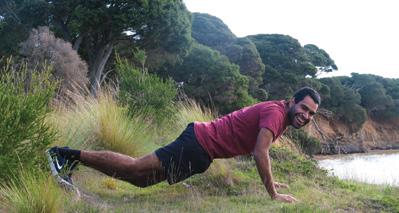
By involving people with lived experience of suicide in designing the resources and training, it helps improve awareness of suicide
risk and increases the capacity of mental healthcare professionals and general practitioners to respond.
Community suicide prevention resources developed include:
• Stories Are Strong articles: inspirational stories of hope and recovery plus resource sheets
• Suicide Prevention Podcast series: six interviews with people with lived experience and experts in the field
• Suicide Prevention Priorities Framework for Gippsland
• Community Suicide Prevention Action Planning resource
• Community Suicide Prevention Action Plan template (editable)
• Wellways Lived Experience short films projects.
Several participants were keen to develop a community resource to assist people caring for someone with a mental health condition and decided the best way to do this was to film themselves chatting about what helped them.
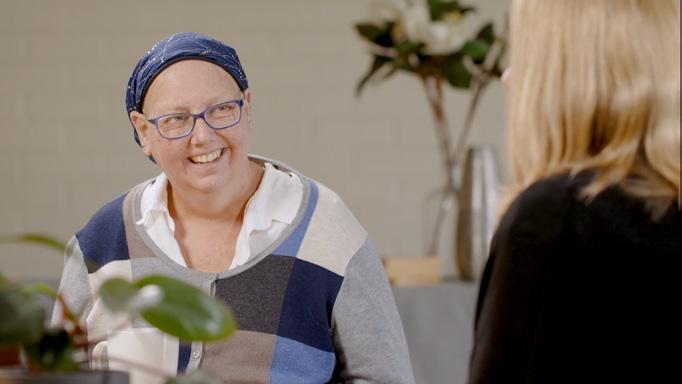
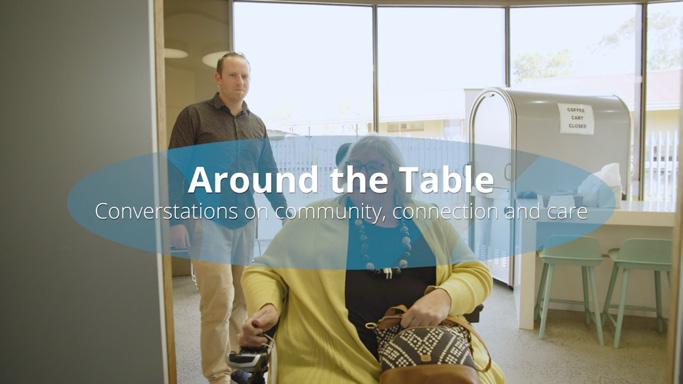
The resulting two short films are titled ‘’Around The Kitchen Table’’ and can be viewed here.
https://kit.wellways.org/community-stories






An inspirational story from Barkindji man Sam Weston is one of 10 featured in Stories Are Strong, a Gippsland suicide prevention campaign featuring stories of hope and recovery, expert advice and resources.
was working inthe health sector. “I thought it was awesomeand wanted to also feel like I was making a

Mr Weston did 169 push-ups every day for two weeks to prepare for the Push-Up Challenge –one for every Aboriginal and Torres Strait Islander person who lost their life to suicide in 2018.

He carried his People, Country and the world’s longest living culture in his heart with every move.
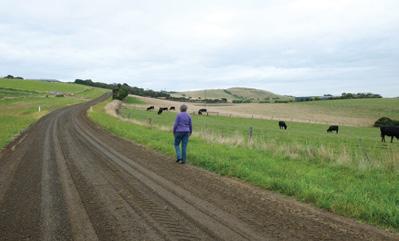
“I’ve got anxiety and depression,” Mr Weston said. “Everyone has issues to deal with, but it’s been a big part of my life for me. So, I took on the push-up challenge to raise funds for mental health. It’s pretty meaningful to be able to do something for others.”
Initiated by Gippsland PHN, the campaign was developed and designed with input from people with lived experience of suicide and experts in the field.
The campaign aimed to help everyone become more compassionate, wise, and resourced to understand suicide. It might give them the courage to start a conversation and save a life.
Stories Are Strong is an initiative of the Place-Based Suicide Prevention Trials project, jointly funded by the Victorian Department of Health and Gippsland PHN.
Stories Are Strong: https://gphn.org.au/about-us/stories-are-strong/
Suicide prevention resources: https://gphn.org.au/what-we-do/programs/suicideprevention-program/
“Enjoy thelittle things.It’s okay tobe happy withwhat you have.”
ARE STRONGProud Barkindji man Sam Weston recently spent time doing 169 push-ups every day for two weeks in preparation for the Push-Up Challenge. One for every Aboriginal and Torres Strait Islander person who lost their life to suicide in 2018 – and he carries his People, Country and world’s longest living culture in his heart with every move.
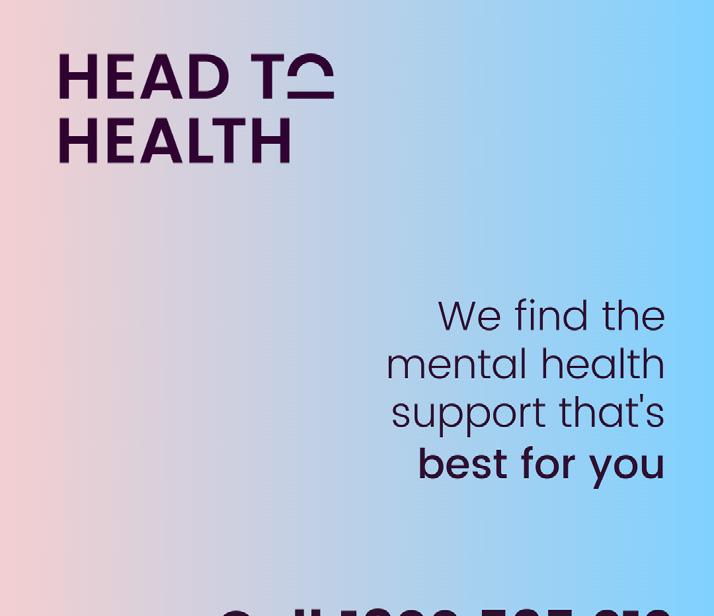
The pandemic has significantly impacted Australians’ mental health, and our Head to Health program continues to support people throughout Gippsland.
People can call Gippsland’s Head to Health intake team on 1800 595 212 to speak to a trained mental health clinician. These clinicians help callers find the most appropriate service and or resources.
In the past year, the intake teams supported more than 3,100 callers and referred over 1,400 people to Head to Health hubs or other services to find their best support.
Two Head to Health hubs opened in September 2020, one in the Wellington Shire and one in the Baw Baw Shire.
The multidisciplinary clinics have supported 900 locals in the past year, offering appointments via phone, video, or face-to-face.
The hubs are co-located with GP practices, increasing their accessibility. They offer a walk-in service, or consumers may be referred by the local Head to Health intake team, their GP, or other clinicians.
Three services with local knowledge support Gippsland’s Head to Health. It’s one way Gippsland PHN invests in improving community health, using local strengths and capabilities.
The Head to Health program has been extended into 2022-23.
Gippsland PHN’s Primary Mental Health and Suicide Prevention Stepped Care program provides access to primary mental health and suicide prevention programs within a stepped care model to improve the overall health and wellbeing of people living in Gippsland.
Gippsland PHN has the flexibility to commission evidence-based services to meet local needs, catchment priorities and service gaps.
It currently commissions three low intensity mental health services, six mild to moderate services and two severe and complex services as well as two Head to Health hubs and four headspace sites.
A mental health nurse working in the Primary Mental Health Care (PMHC) program assisted first-time parents to connect with services to manage mental health symptoms and engage with community support programs.
The first-time parents presented to the nurse with moderate to severe mental health issues. A referral was made for the mother to the perinatal service at tertiary hospital and enhanced maternal and child nurse home visiting service. An inpatient stay for mother and baby was arranged when the father’s mental health deteriorated.
The mental health nurse coordinated referrals to community services such as social worker and The Orange Door, as well as connecting with an online psychologist for management of mental health symptoms.
The family is continuing to access professional and community support, with ongoing clinical care coordination by the mental health nurse.
An adult person attended a general practitioner for help with anxiety symptoms. On assessment, they revealed a recent trauma related to one of their children. Symptoms included difficulty concentrating, poor sleep, physical symptoms of anxiety, and panic attacks. Alcohol was being used to self-medicate.
The GP and client identified that these symptoms were likely a post-traumatic response, confirmed by a subsequent psychiatrist assessment.
A combination of medication and psychological therapy was prescribed to reduce anxiety symptoms and promote sleep. Multidisciplinary care included psychoeducation, relaxation training, harm minimisation in relation to alcohol use, as well as weekly support from the mental health nurse.
The client reported significant reduction in overall feelings of anxiety and panic, with continued support from the Head to Health hub while awaiting private psychology referral.
A young person was referred to the Alcohol and Other Drugs (AOD) service in relation to alcohol and cannabis use, with a history of poor engagement with services due to substance use.
The person reported a history of complex relationships involving conflict.
The AOD support worker provided a safe environment for the young person to talk about their illicit substance use, resulting in agreement to attend detox and rehabilitation. The young person was linked in to detox in south east Melbourne and rehabilitation in Gippsland.
The AOD support worker attended both services with the young person and visited during treatment to maintain the connection. The young person is now drug free and pursuing education in health sector.
Watching Bill Parker ride his motor scooter through the streets of Drouin, with his piano accordion strapped to the back of it, is a sight for sore eyes for staff at Lyrebird Village Aged Care facility.
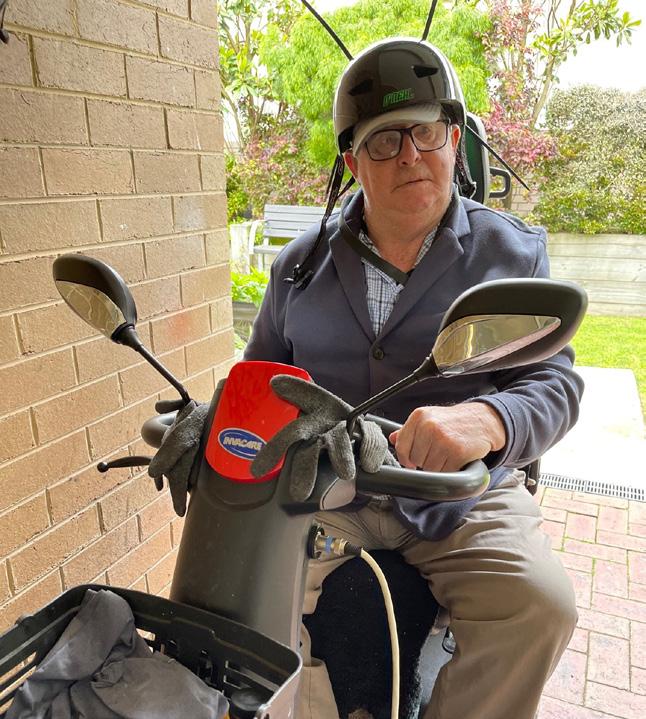
It wasn’t too long ago that Bill had no desire to do much at all; illness and COVID-19 had finally taken its toll.
After self-referring to the Mental Health in Aged Care (MHiAC) program, Bill has his spark back. He has returned to busking outside the local supermarket, chatting to friends who pass by and entertaining residents at the Drouin facility with his accordion and piano playing.
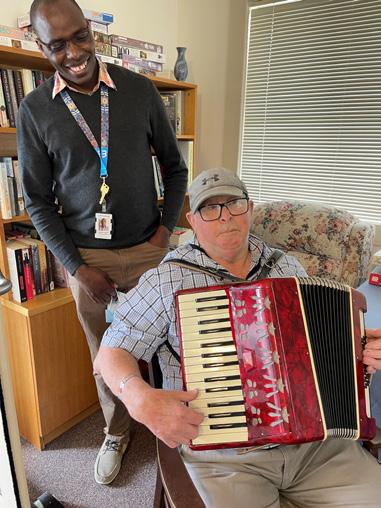
“Everything came to a head,” he recalled. “A bout of pneumonia left me ill, my fingers stiffened and I couldn’t walk. COVID-19 just made everything worse with little or no contact with the outside world.”
That’s when he saw a brochure about the MHiAC program, being delivered by Wellways across Gippsland with funding from Gippsland PHN. He discussed it with staff who encouraged him to find out more and then he self-referred.
That was the start of a partnership with his Wellways’ mental health and wellbeing worker, Japhet Lagat, that has not only seen Bill’s mental health improve but also a healthy respect and friendship developed between the two.
Japhet has helped Bill reconnect with the things he loves and cherishes – especially his music. Each MHiAC participant has different needs and every interaction is different.
“We work together to develop strategies and coping mechanisms,” Japhet said. “We also looked back at Bill’s life and encouraged him to cherish his many achievements. Your story doesn’t stop when you go into care…it continues.”
Japhet discovered that Bill grew up on a local dairy farm and had spent a large part of his life working for various local charities. In fact he was presented with many awards and certificates, acknowledging his valued work. These are now proudly displayed in a glass fronted cabinet outside his room, together with some much-loved possessions such as a whip, which he demonstrates how to crack.
Japhet also captured Bill’s musical talents on video to share with the MHiAC program participants in Bairnsdale. The feedback he received still makes him smile.
* Bill Parker sadly passed away on 22 September 2022. His family asked that his story remain in our annual report
Mental Health in Aged Care aims to support residents living in or transitioning to residential aged care across Gippsland. Residential Aged Care Facilities (RACFs) can engage with in-reach mild to moderate mental health support for their residents through the Gippsland PHN Mental Health in Aged Care program.
It has been identified that residents both transitioning into residential aged care, and those currently living in residential aged care facilities have high rates of common mental illness with mild to moderate depression. The aim of the program is to provide an emotional wellbeing model for low intensity psychological in-reach services
Three Monash University students participated in the second annual Summer Scholars program 2021-2022, delivered by Gippsland PHN and Monash Rural Health.
Ruby Doherty, Salima Hussaini and Yue Ming Loi were accepted for two, three-week placements in December 2021 and January and February 2022.
Gippsland PHN and Monash Rural Health developed the program to support local students. The students focus on factors affecting local health, a priority area for Gippsland PHN.
The three study topics were:
• The effects of the COVID-19 pandemic on the mental health of rural families with school-aged children
• The impact of poor housing quality on asthma in children
• Further integration of housing and education services into youth alcohol services in Gippsland.

The students received training on literature searching, quantitative and qualitative research methods, and ethics. They engaged with local stakeholders and recommended evidence-based, feasible interventions.
It’s one of the ways Gippsland PHN is working with partners to ensure our investments are spent where they’re needed most to improve health and wellbeing in Gippsland.
Heroes of Black Summer children’s picture book
Building community connections
Art therapy in remote communities
Professional development and education


Children and families in fire-affected regions benefited from a children’s picture book telling the stories of ‘heroes’ who helped protect East Gippsland during and after the region’s terrifying 2019-20 summer of bushfires.
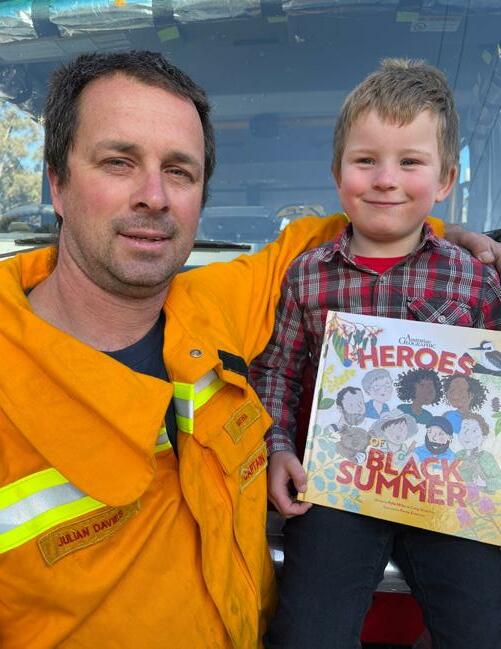
East Gippsland author Kylie Miller co-wrote Heroes of Black Summer with Craig Sheather to help children process the trauma they experienced during the fires. It was illustrated by Karen Erasmus and published by Australian Geographic.
The book was published with support from a One Good Community Wellbeing Grant through Gippsland PHN.
The authors hope Heroes of Black Summer promotes resilience in children while strengthening the connection between children and adults as they read and heal together.
More than 58 per cent of East Gippsland – including Kylie’s own property – was burnt in the fires, which raged for three months and has had a devastating and long-lasting impact on the community.
The book captures moments such as the rescue of koalas and other endangered species, rescue operations in Mallacoota, and a pay-it-forward scheme set up by Nowa Nowa General Store to share donations.
The authors donated 500 copies of the book to children in fire-affected communities.
Gippsland PHN supports the community to achieve better health outcomes by building strong relationships with stakeholders.
It helps connect service providers with the community to better meet healthcare needs through these relationships.
In 2021, Our Place Morwell sought Gippsland PHN’s assistance in approaching local general practices to provide an outreach GP service for its students. Our Place Morwell already had a visiting paediatrician and maternal health nurse and believed a visiting GP could complement its clinical services.
Gippsland PHN staff identified Royal Medical Centre in Morwell as a clinic that might be interested. The team met with both parties, and the Royal Medical Centre ran its first clinic at Our Place on 16 March 2022.
The partnership means families at Morwell Central Primary School and Goodstart Morwell Central can attend monthly appointments with Dr Hiran Rajapakse. Appointments are bulk billed, leaving parents and guardians with no out-of-pocket expenses.
This means a clear flow of GP referrals to the paediatrician with high-priority children fast-tracked to the next on-site paediatric clinic. There also is a strong focus on mental health plans to help children and their families address the impact of the pandemic.
Our Place Morwell expects the development to deliver tangible and measurable benefits to the health and education outcomes for children in Morwell. Teachers also welcome the partnership, acknowledging the importance of good health and mental health on children’s learning and education.
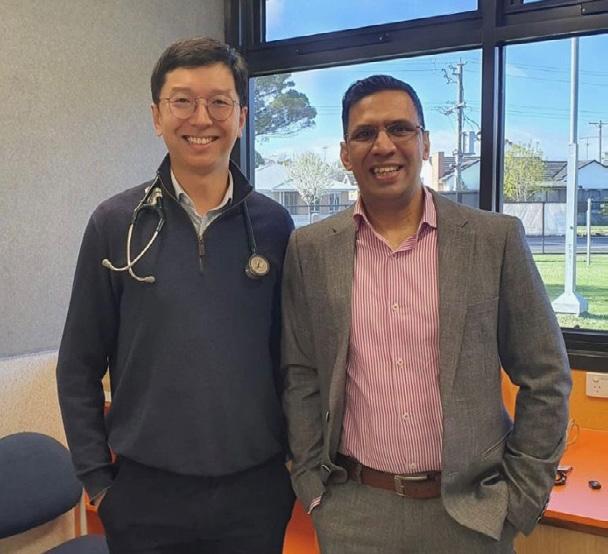
Dr
Soh
Hiran
Royal Medical Centre
Morwell who visit Our Place Morwell, a community initiative to achieve better health outcomes by building strong relationships.
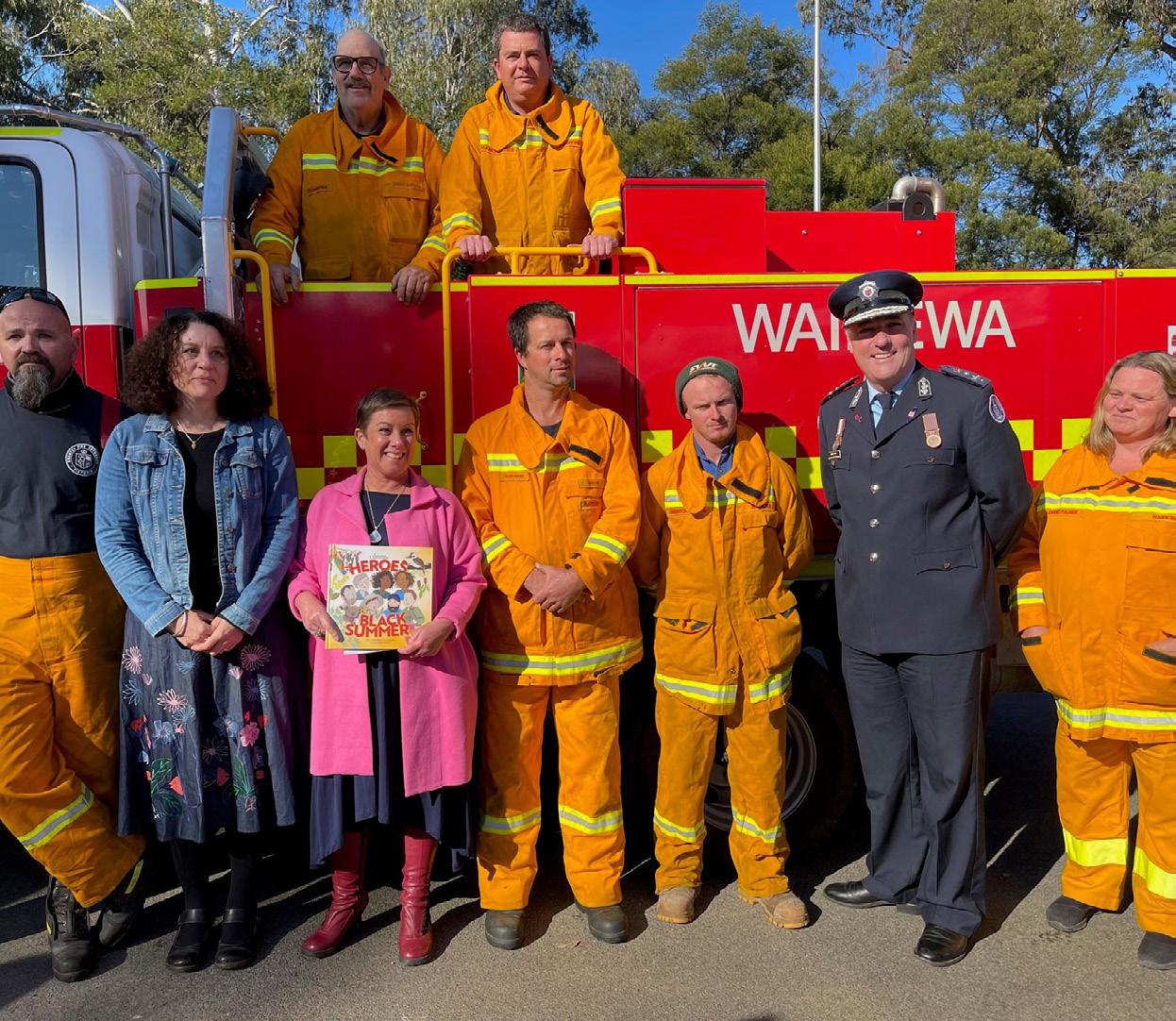 Bryan
and Dr
Rajapakse from the
in
Bryan
and Dr
Rajapakse from the
in
Adults who lived through the devastating East Gippsland bushfires took part in a six-week art therapy program to help them process the trauma.

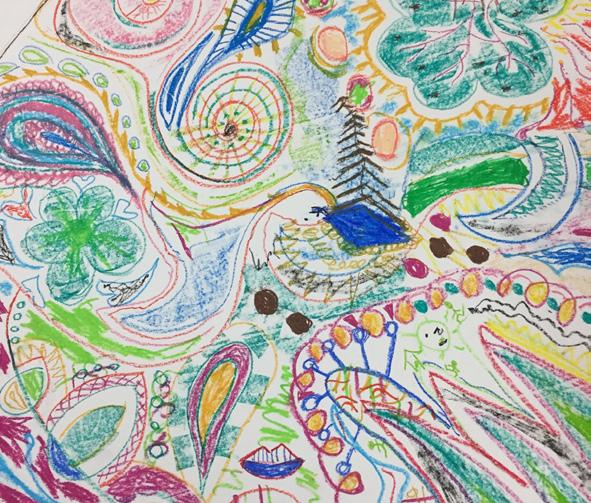
The program aimed to support adults in Cann River and Mallacoota for whom ‘talk therapy’ wasn’t an option.
Funded by Gippsland PHN, the program was delivered by Gippsland Lakes Complete Health art therapist Andrea Farley and two outreach CARE workers from the Royal Flying Doctor Service (RFDS) Victoria, Amber Wade and Michelle Connell.
RFDS Victoria Team Leader – Wellbeing Operations, Molly Stilo, said while the service had provided mental health and wellbeing services in the region for five years, this was the first time it had offered art therapy.
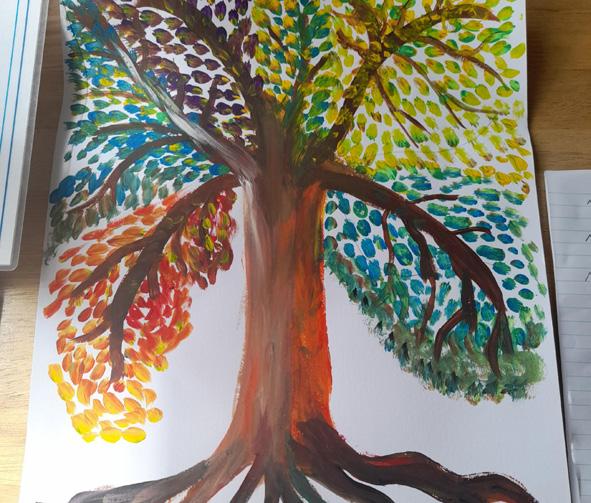
“The program was aimed at people impacted by the bushfires, particularly those who have difficulty articulating their feelings and are reluctant to engage in traditional talking therapies,” Ms Stilo said. “Art therapy provided these people a way to access, express and process their emotions and experiences.”
By the end of the program, participants had created expressive pieces of art using MeCards, mandalas, a tree of self, poems, an animal totem, prayer beads, a journey image and a hand of gratitude.
Gippsland’s general practices have been at the forefront of the COVID-19 pandemic response.
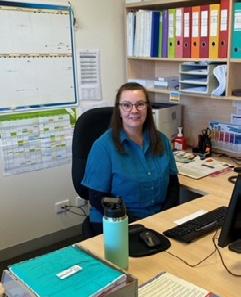
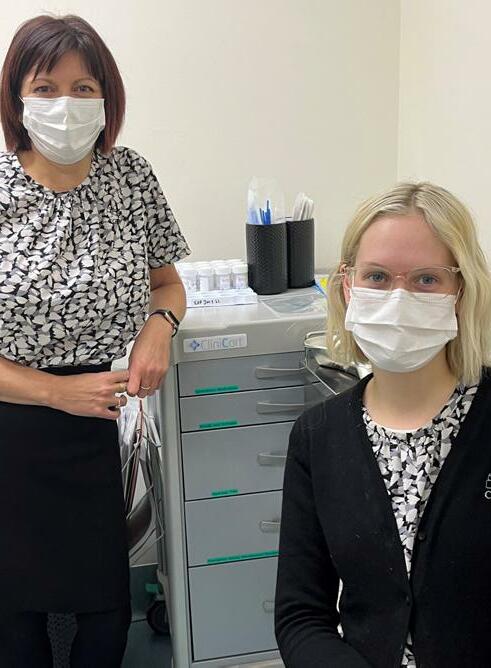
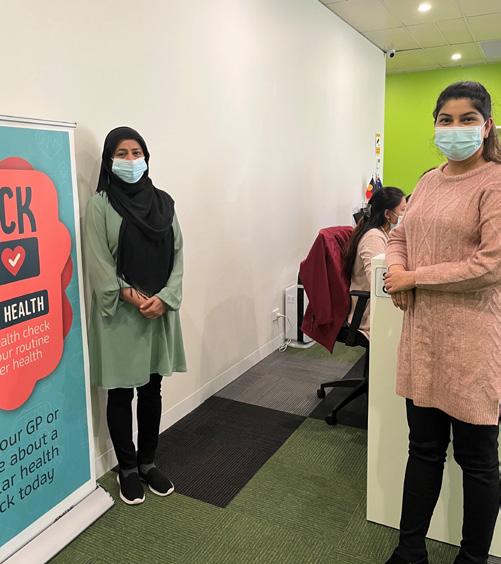
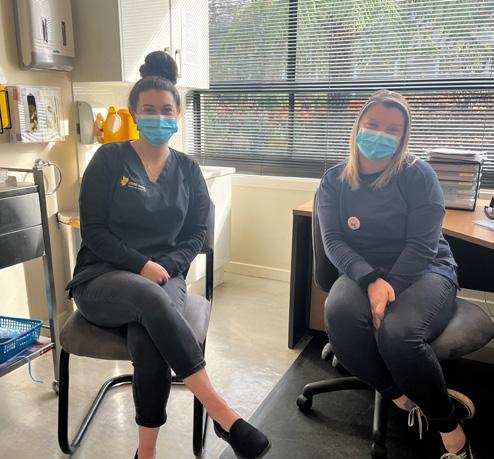
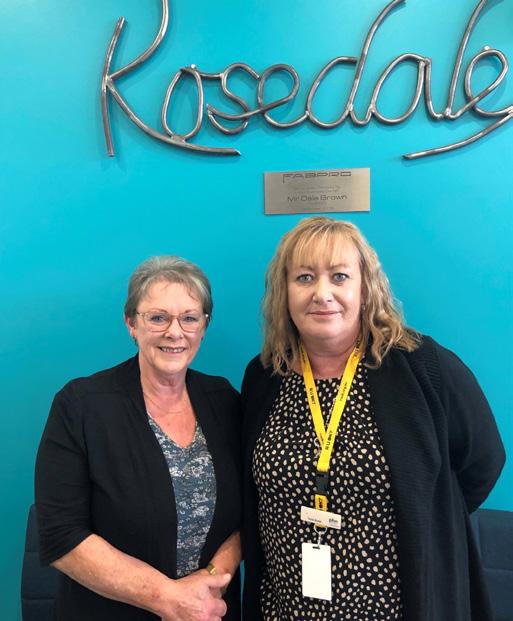
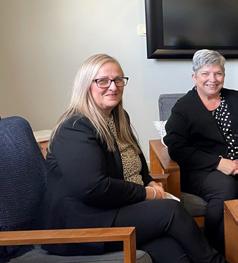
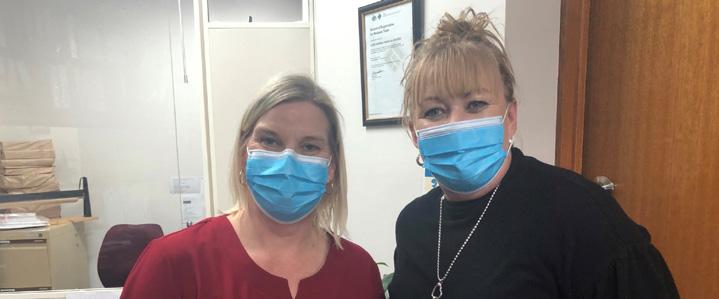
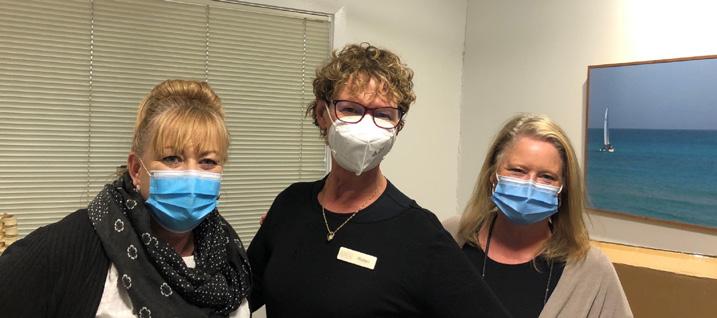
Staff have adapted to significant change and challenges to ensure the ongoing care of their patients as we continue to experience unprecedented times.
This is a snapshot of some of our amazing general practice staff.

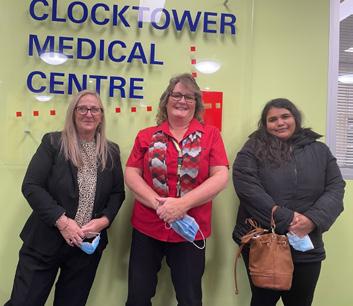
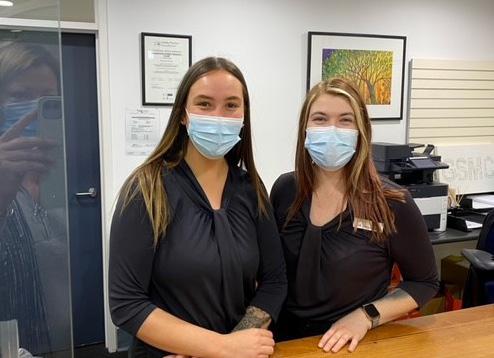
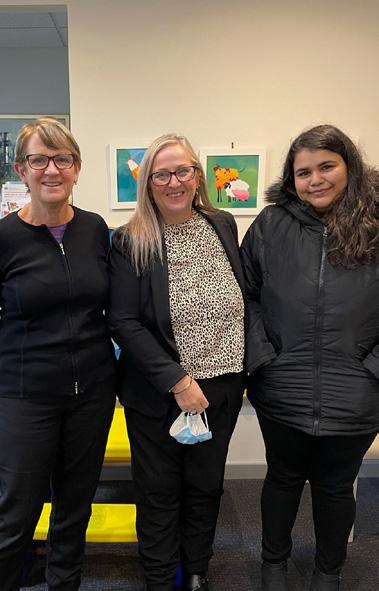
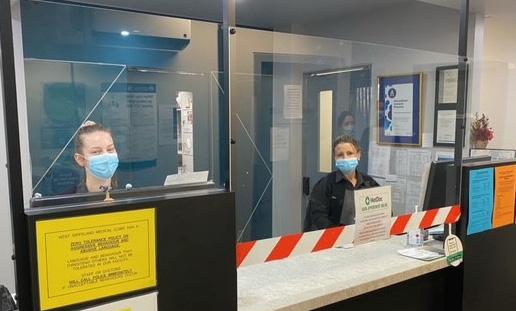
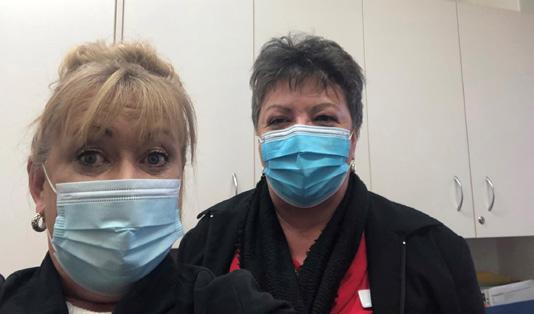

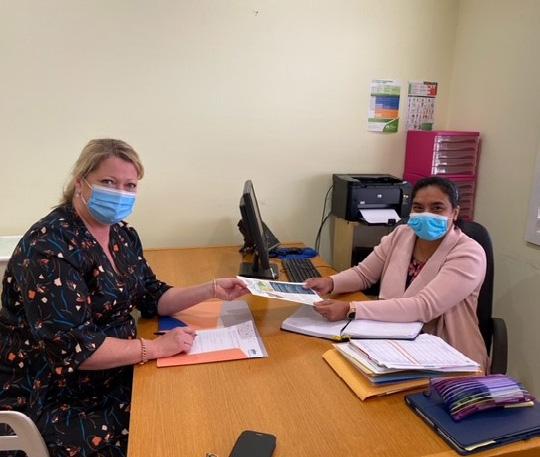
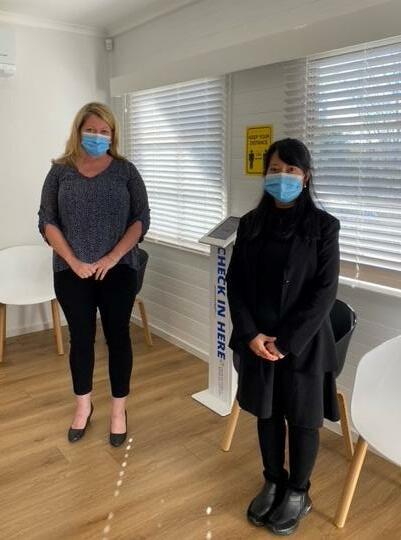
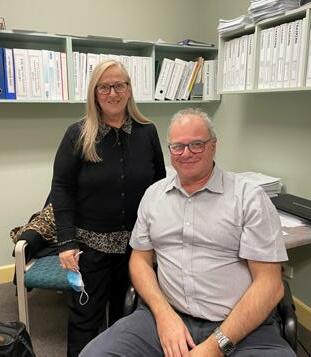
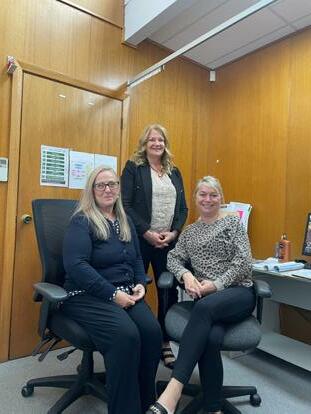
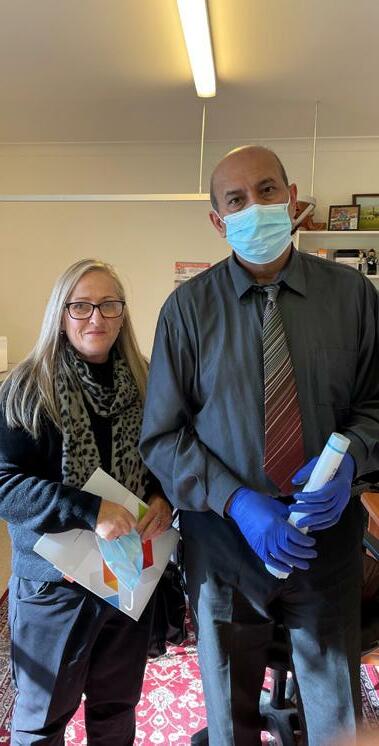



Health journalist, broadcaster and commentator Dr Norman Swan was the special guest and keynote speaker at the 2020/21 Gippsland PHN’s annual general meeting and 2021 Gippsland Primary Health Awards.
One of Australia’s most trusted voices on COVID-19, Dr Swan used the opportunity to urge people to have COVID-19 vaccine booster shots.
“This is not a two-dose vaccination strategy – it’s a three-dose strategy,” he said. “We can’t rest on our laurels as it will come back in our winter. Pandemics are here to stay.”
Dr Swan described primary care “as the cornerstone of health”, attributing the reduction of many diseases in Australia to the prevention and early intervention work undertaken in primary care.
“What GPs and primary care do for people is so important,” he said. “People have stopped smoking, you’ve reduced cardiac risk by controlling blood pressure, cholesterol and diabetes. You have extended the life expectancy of Australians by years.”
Gippsland healthcare professionals and organisations were honoured for their work at Gippsland PHN’s 2021 Gippsland Primary Health Awards.
Respected health journalist and commentator Dr Norman Swan announced the winners of the five categories at an online event attended by more than 100 people.

The ‘Better access to health services’ award went to the Gestational Diabetes Team at West Gippsland Healthcare Group for ensuring there was no disruption to the Gestational Diabetes Service due to the pandemic.
Jamie Supple from Outcome Health claimed the ‘Better prevention’ award for developing the Gippsland PHN COVID-19 Testing report.
The award for ‘Better support for diverse communities’ went to Gippsland Lakes Complete Health and Nowa Nowa Community Development Group for working to improve mental health through an increase in community connectedness in the drought and fireimpacted community of Nowa Nowa.
Dr David Campbell and Dr Yousuf Ahmad shared the ‘Better partnerships’ award. Dr Campbell is chair of the East Gippsland COVID-19 Sub-regional Network, and Dr Ahmad chairs the Wellington group.
The ‘Better primary care research’ award went to Dr Lindy Washington of Bairnsdale Regional Health Service. Dr Washington was honoured for her contribution to high-quality research findings and data presented at the East Gippsland COVID-19 Subregional Network meetings, providing support for general practitioners and health services during the pandemic.
Gippsland PHN’s vision for reconciliation is to address Aboriginal and Torres Strait Islander people’s rights to equity of access to culturally safe and inclusive primary health care in Gippsland.
In achieving this vision to strive for equitable health and wellbeing, Gippsland PHN is guided by the diverse Aboriginal and Torres Strait Islander voices from across the region.
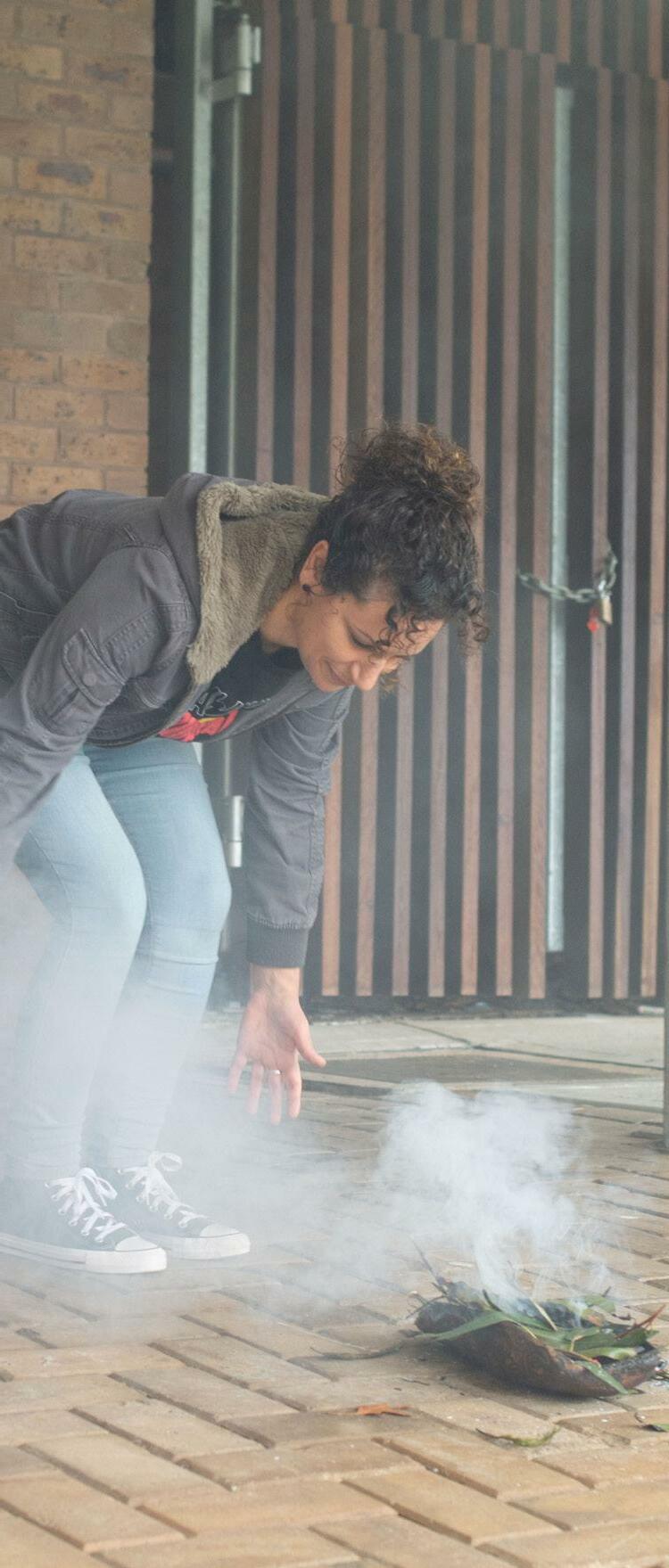
In 2021, Gippsland PHN engaged consultant Brian Stevens to guide and support the development of its Reconciliation Action Plan (RAP).
Brian is a proud Gunai man who has a deep understanding of cultural knowledge and Aboriginal community protocols, supported by a career that spans over three decades. Brain led Gippsland PHN through a series of workshops to help develop a draft RAP.
Over the past 12 months, Gippsland PHN has undertaken an extensive stakeholder engagement process to seek community feedback on the draft RAP.
Aligning with the Reconciliation Australia framework, the Gippsland PHN RAP outlines its vision, as well as specific actions and deliverables under the five dimensions of reconciliation:
The Gippsland PHN RAP Working Group has been working with Reconciliation Australia to refine and finalise Gippsland PHN’s first RAP. This is now in the final stages and once endorsed by Reconciliation Australia, Gippsland PHN will launch the RAP in the coming months.
Data is essential to delivering high-quality health care and is the foundation of Gippsland PHN’s planning and operations. It is fundamental to providing quality, evidence and outcomes-based decisions.
When we understand the community’s needs, we can identify problems and invest in solutions. We can identify opportunities and invest in improvements.
Gippsland PHN has a large and growing number of data assets. It relies on strong data governance to perform its functions effectively and maintain the trust of data providers, data recipients and stakeholders in acquiring, handling and releasing data.
Gippsland PHN is working to improve its data governance and grow its capacity and capability through the Data Governance, Ethics and Research Group, which is responsible for privacy and data governance matters.
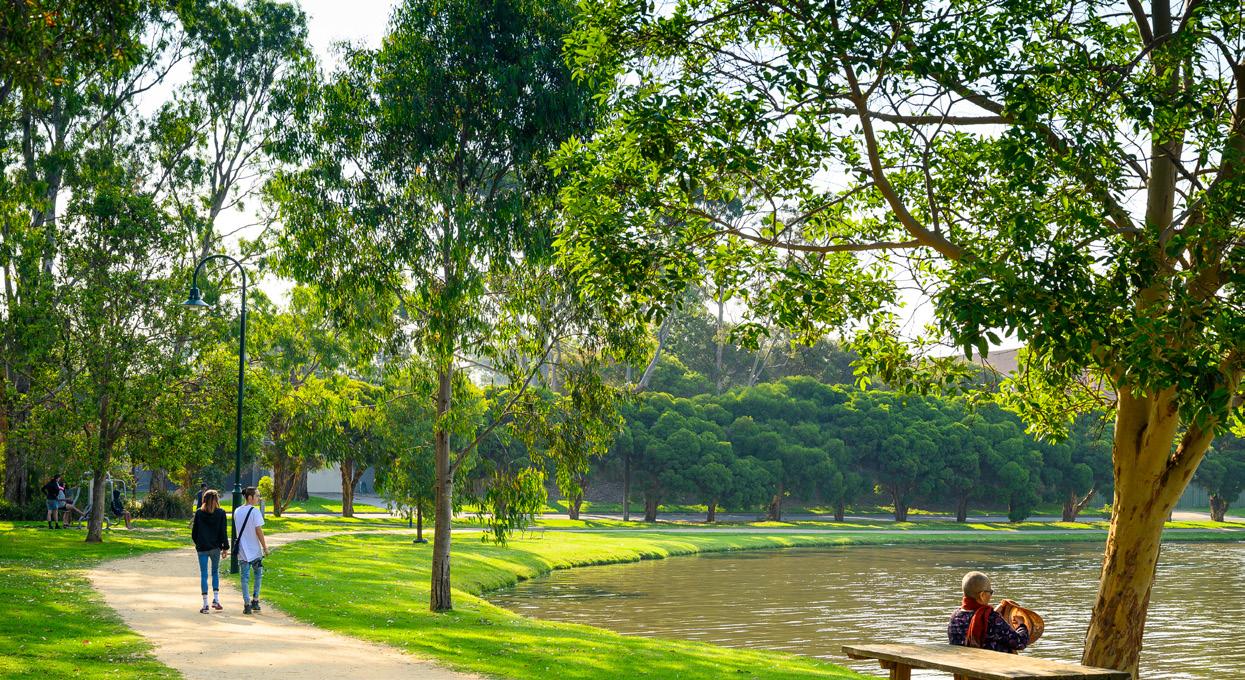
Over the past year, all Gippsland PHN staff have completed privacy impact assessment training and the Office of the Australian Information Commissioner’s Privacy in Practice e-learning course.
Gippsland PHN regularly updates the Data and Information Assets Register and has begun privacy impact assessments on selected projects.
High-quality general practice research is essential in ensuring the Gippsland community can access evidence-based primary health care.
Gippsland PHN works with university and research partners to improve the quality of health services and tailor them to meet community needs.
Gippsland PHN has strong relationships with local universities, including a Memorandum of Understanding with Monash Rural Health, Monash University. This formalises Gippsland PHN’s commitment to work together on projects and priorities of mutual interest.
Monash University’s Human Research Ethics Committees granted ethical approval for three collaborative research projects in the past year.
Gippsland PHN has also collaborated on five primary care research projects, including the Health Needs Assessment community survey and interviews with Monash University.
It has contributed to peer-reviewed journals, collaborated on five primary health grant applications, and worked on evaluation projects, including evaluating Gippsland PHN’s advisory groups.
Gippsland PHN shares all data produced by research and evaluation activities across the region and more broadly, advocating for improved health outcomes for the Gippsland community.
The 2022 Gippsland PHN staff benchmarking survey results saw improvements across the organisation.
Being accredited under the QIC Health and Community Services Standards (7th edition) is a significant aspect of Gippsland PHN’s Quality Improvement Systems.
It assures staff, funding bodies and all stakeholders that Gippsland PHN strives for, and successfully maintains, excellent in quality and performance.

Gippsland PHN has changed how it funds health services to ensure they best meet local health needs.
The new outcomes-focused commissioning approach aligns commissioned services with needs identified in the recent Gippsland Health Needs Assessment, recommendations from the Royal Commission into Victoria’s Mental Health System, and current evidence-based approaches.
It includes funding for services in primary mental health care, alcohol and other drugs, and psychosocial support.
From August to October 2021 and with the assistance of Larter Consulting, Gippsland PHN undertook a range of stakeholder consultations to inform this procurement.
Collectively, across both Alcohol and Other Drugs Services (AOD) and Primary Mental Health Care (PMHC), more than 30 stakeholder consultations were held. In October 2021, one open forum was held with the primary care health sector and one with people who have lived experience and are living with drug and alcohol dependency, advocates and the community.
• Primary Mental Health Care and Psychosocial Support program – 12 contracts valued at $4.6 million
• 13 tenders published seeking service provision in Primary Mental Health Care, Drug and Alcohol Treatment, Psycho Social Support, After Hours Primary Health Care, Indigenous Dual Diagnoses, Doctors in Secondary Schools, Allied Health and Consultancy support.
A workshop for co-design of the specification was held with industry experts in October 2021.
What stakeholders told us they wanted from services was:
• More coordinated and integrated care
• Flexible models of care
• Central intake services are important for both consumers and services
• Multidisciplinary hubs, with co-location highly recommended
• Lived experience is beneficial to improve service quality and consumer experience
• Integration between mental health and AOD services is important for consumer outcomes.
The inclusion of people with lived/living experience, service providers and industry experts were key elements in contributing to supporting evidence.
• 11 request for quotes, expressions of interests and grant programs issued including:
◊ Start-up funding for general practice to remotely monitor COVID-19 patients
◊ General Practice Wellbeing grants
◊ Vaccinating Vulnerable Populations
◊ Living with COVID19 - Home Visits to Positive Cases
◊ Nurse Immunisation Grants to assist with the Covid-19 Vaccines in Residential Aged Care Facilities
◊ Capacity Tracker Grants to help identify workforce capacity during pandemics and natural disasters
◊ Grants to help increase breast, bowel and cervical cancer screening
◊ Grants for Pop Up Health Assessment Clinics
• Workforce Scholarships Program have supported 58 people to achieve qualifications or attend professional development OUTCOMES:
HARD TO REACH HAVE ACCESS TO APPROPRIATE SERVICES
Latrobe Health Innovation Zone project focused on addressing health gaps in Latrobe in response to the Hazelwood Mine Fire Inquiry
• Gippsland HealthPathways helps providers understand best practice and the best referral pathways for their clients • Remote Patient Monitoring and Social Prescribing projects use technology to manage chronic disease • One Good Community Digital Health Toolbox equips health care workers to provide seamless care
General practice are using data to drive quality and business improvement in a way that joins up care for patients • Introduction of Your Experience of Service survey so that providers understand what their clients need
Improving access through programs which delivered the following occasions of service at no cost to the client
Key points of interest include:
A total of 80 clinical service agreements across 12 programs.
A total of 27 health services with licenses to the Lifeguard platform.
Completion rates for Clinical Outcome Measures YTD 57%; increased from 20-21 at 22.2% and 19-20 at 7.6%.
Increase of ‘met’ indicators in Q4 across all outcome themes: Addressing Needs, Quality Care, Improving Access and Coordinated Care.
Analysis for 2021-22 suggests strong improvement across all outcome themes.
Amanda Proposch is a healthcare management professional with 15 years’ experience in general practice management and more than 10 years’ experience in private and public hospital nursing roles, including senior management and healthcare redesign. Amanda has a track record of substantial contribution in the application of improvement methodology in healthcare, coaching and developing high performing teams, and elevating operational efficiency, productivity and consumer experience.
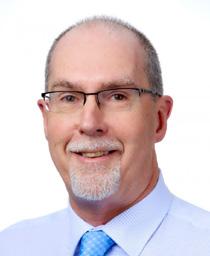
Steve Morgan is an accountant with more than 25 years’ experience in senior management roles, including chief financial officer in not-for-profit and commercial organisations in Victoria, South Australia and New South Wales. Before joining Gippsland PHN, Steve’s most recent role was Financial Services Manager at Castle Personnel Services, a disability employment provider in NSW.
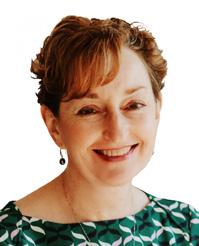
Angela has 30 years’ experience in healthcare, initially as a physiotherapist with an interest in women’s health and later as general manager at Latrobe Regional Hospital. Her qualifications include a Master of Health Service Management. She is a Certified Health Executive and Fellow of the Australasian College of Health Service Management. Angela also has a strong interest in governance through her role as a non-executive director at Yallambee Aged Care Traralgon and she is a Graduate of the Australian Institute of Company Directors.
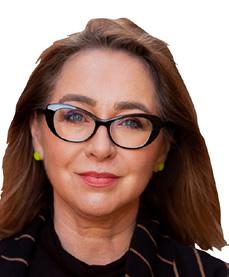
- Chair -
Therese has had more than 40 years’ experience in the health sector in CEO and senior management roles since 1994. She has been a CEO in metropolitan Melbourne and regional Victoria and in both the private and public health sectors.
- Deputy Chair -
Julie has more than 20 years’ experience in the Gippsland health sector having worked in the general practice, hospital, community health, government and GP training sectors. She supports strong local primary healthcare, especially to more marginalised populations.
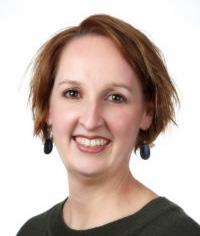
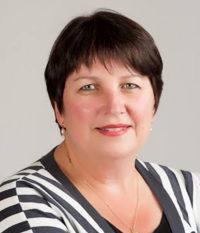
resigned November 2022
Alex is a passionate Gippslander, with ten years’ experience on the board of Gippsland Southern Health Service (GSHS) and has recently retired as the President and Chairman.
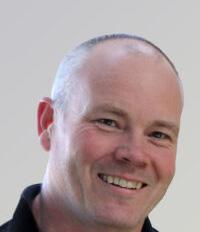
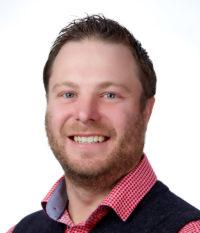
Murray is a strong leader and an experienced commercial lawyer specialising in strategic planning, project management, risk management and governance. He has successfully worked across all levels of government, many private and not-for-profit organisations and local community groups.
Anne has served as a CEO and non-executive director in both the public and private healthcare sectors for more than 30 years. She has strong connections in the healthcare sector and at government levels with a passion and expertise in quality assurance in healthcare.
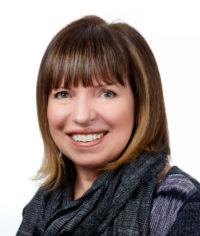
Elisabeth is a General Practitioner at the Gippsland and East Gippsland Aboriginal Cooperative (GEGAC). She previously spent 12 years training and working at Gippsland Lakes Community Health, providing clinical services to several East Gippsland towns including Aboriginal Health services, Omeo District Health and in youth healthcare provision roles.
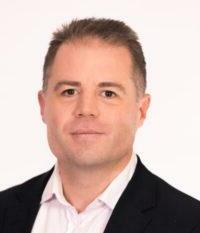
Nathan has served on the Board of Latrobe Health Insurance, West Gippsland Healthcare Group and Latrobe Community Health Service. Nathan has over 20 years’ experience in the private and public sector in executive positions, management, consulting and finance/accounting. He is currently the regional finance manager for South Eastern Victoria with the Department of Education and Training.
Letitia is a GP Anaesthetist based in West Gippsland, and a fellow of the RACGP. Her clinic work is a combination of hospital anaesthetics and general practice with a focus on providing quality acute care within rural communities.
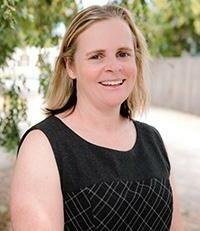
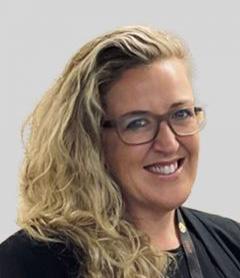
Committee:
Anne Peek (Chair)
Alex Aeschlimann (Board sponsor)
Catriona Knothe
Sue Kearney
Dianne Goeman
Sue Gaffney
Bass Coast & South Gippsland Clinical Council
John Lawrence
Lisa Simpson
Susan Armstrong Clare Plozza
Eleanor Mitchell
Paul Apostoleris
Marion Byrne
Pam McGrath
Dr Jacqueline McDonnell (Chair)
Anna Langley
Denise Escreet (comm. March 2022)
Francis Sullivan (until January 2022)
Latrobe & Baw Baw Clinical Council
Dr Mitchell Kraan (Chair)
Dr Mark Crowley
Elizabeth Plunkett
Joelene Gathercole
Niyi Omoniyi (until January 2022)
Audra Fenton
Dr Letitia Clark (Board sponsor)
Leanne Coupland
Nadeem Siddiqui (until January 2022)
Robert Celada (until January 2022)
Dr Kathryn Brotchie
Dr Liz Wearne (Board sponsor)
Carlene Hurst
Scott Aitkin (comm. March 2022)
Soetkin Beerten (until January 2022)
Kristen Yates Mathews
Tania Findlay (until November 2021)
Dr Raymond Carne
Wellington & East Gippsland Clinical Council
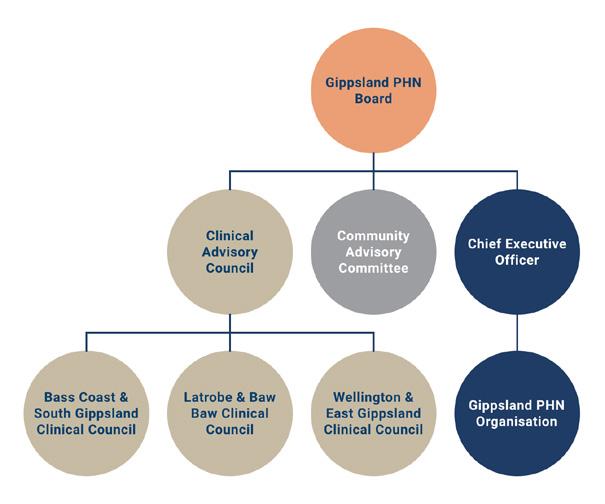
Dr Patrick Kinsella (Chair)
Dr Emma Gault
Dr Elisabeth Wearne (until March 2022)
Owen Connolly Paula Morgan
Sharon Gennings
Therese Tierney (Board sponsor)
Brendon Moar
Margaret Griffiths
Sophie Wilson
Lindy Thunder Hayley Schuback
The 2021-22 financial statements of Gippsland Health Network Limited were prepared by Andrew Frewin Stewart and were completed in accordance with the applicable Australian Accounting Standards, reduced disclosure requirements of the Australian Accounting Standards Board, and the Australian Charities and Not-for-profit Commission Act 2012.
Gippsland Health Network Limited utilises accrual accounting based on historical cost, modified where required.
2021-22 2020-21 $ $ $ $
Total Income from all sources 31,600,065 30,403,329
Total Expenditure for all programs 31,355,577 30,208,300
Surplus/(Deficit) 244,488 195,029
Total income comprised: Government grants 29,946,142 28,749,014 Other grants 955,362 811,917 Other income 698,561 842,398
STATEMENT OF FINANCIAL POSITION 2021-22 2020-21 $ $ $ $
Assets
Current 17,793,718 16,890,267 Non-Current 1,028,235 18,821,953 823,858 17,714,125
Liabilities
Current 15,557,396 14,877,555 Non-Current 711,760 16,269,156 528,261 15,405,816
Net Assets 2,552,797 2,308,309
Equity
Retained Earnings 2,552,797 2,308,309
The detailed 2021-22 audited financial statements for Gippsland Health Network Limited can be found on the Gippsland PHN website at www.gphn.org.au